Low maintenance garden ideas: 29 stylish ways to create an easy-care plot
Get a gorgeous plot without the work with our low maintenance garden ideas – from landscaping to planting schemes and more
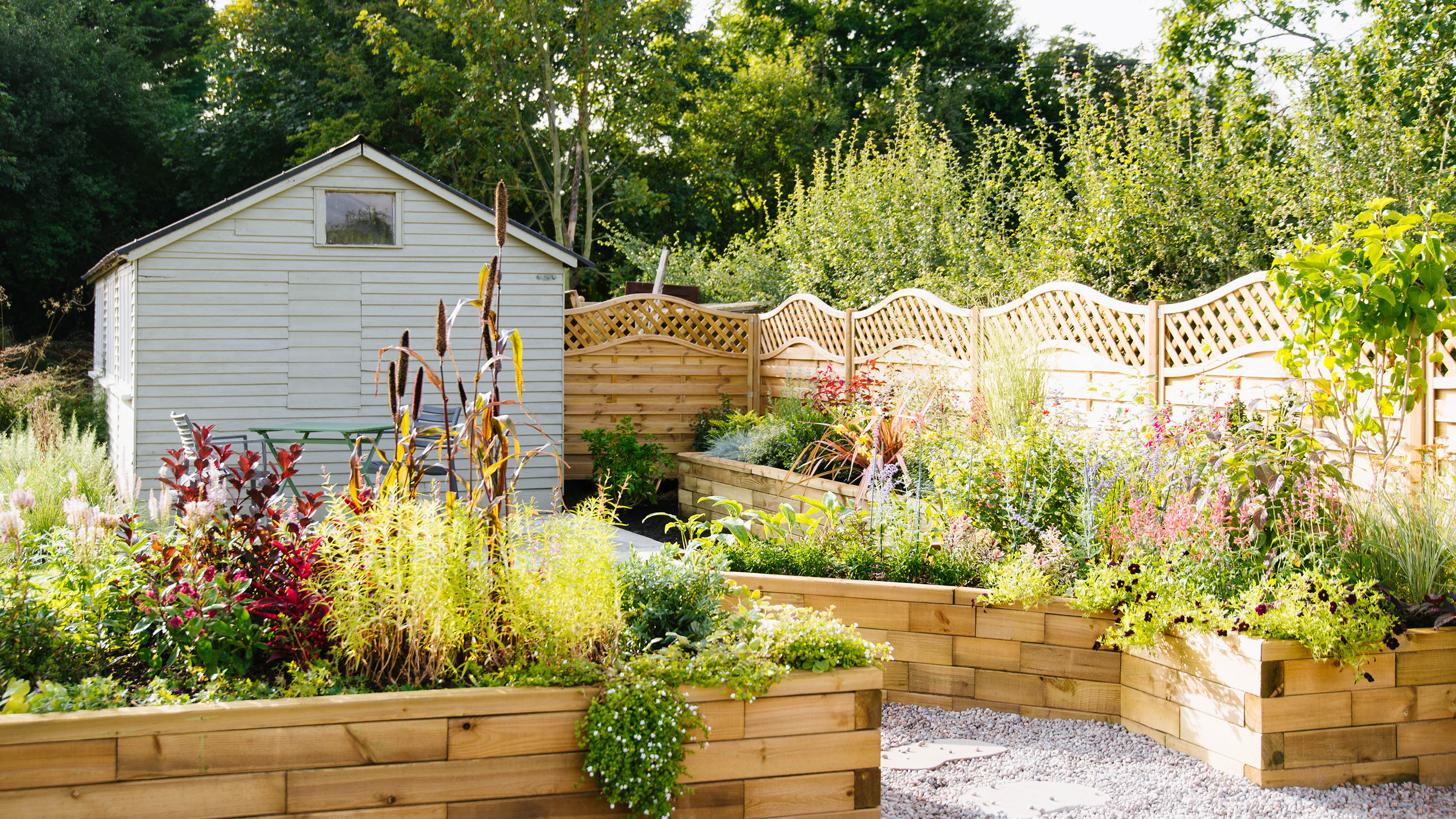
Not got the time for lengthy gardening jobs? Then these low maintenance garden ideas are just what you need.
Sometimes, keeping your garden design ideas looking tip-top can feel daunting – most of us are busy enough as it is without tons of outdoor chores. But with a few tips and tricks, a low maintenance garden is a simple goal to achieve. And don't think that style has to be sacrificed for an easier gardening life – from fuss-free paving to gorgeous containers and furniture, your plot can still look the part without all the work.
As Sarah Squire, Chairman of Squire's Garden Centres says, 'We all lead busy lives, so it's no surprise that people sometimes feel that they don’t have enough time for gardening. However, there are lots of things you can do to make life easier for yourself in the garden.'
Low maintenance garden ideas: 29 looks that are easy to recreate
These low maintenance garden ideas will help you to spend more time relaxing, rather than working, in your plot. And, they look fantastic, too.
1. Soften a patio with pockets of planting
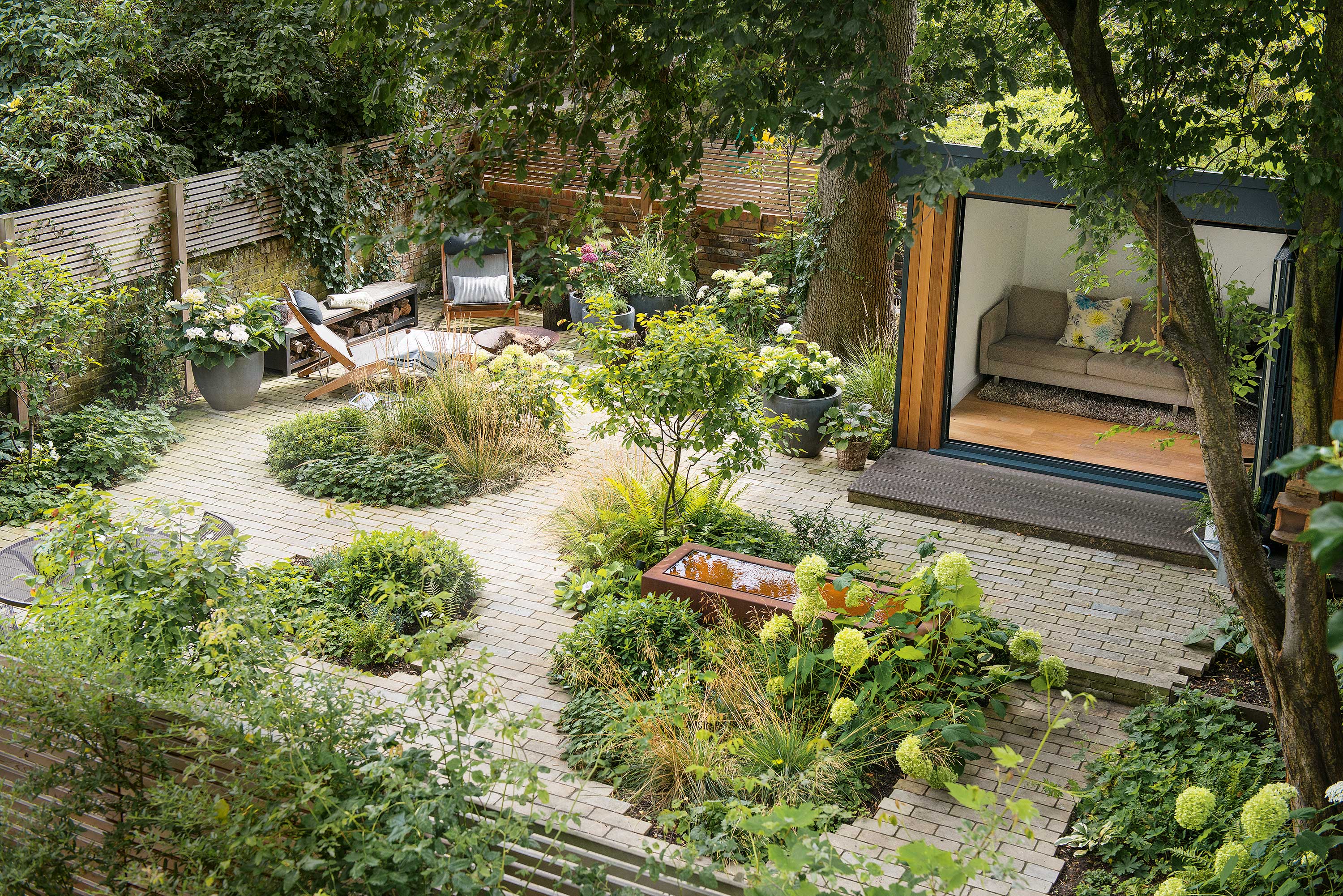
This low maintenance patio is sumptuously planted for an organic feel
This verdant space is full of intriguing yet low maintenance features. Modern materials blend harmoniously with wilder pockets of perennial planting, sporting the likes of easy-care hydrangeas, ferns, and ornamental grasses. Meanwhile, the garden building adds a chic place to relax whatever the weather. And water feature ideas are an instant way to elevate a space – offering a ton of sensory benefits with very little effort required.
Tempted to recreate the look? Our guides on how to grow hydrangeas and how to grow ornamental grasses will help you get started.
2. Mix up materials for a chic seating spot
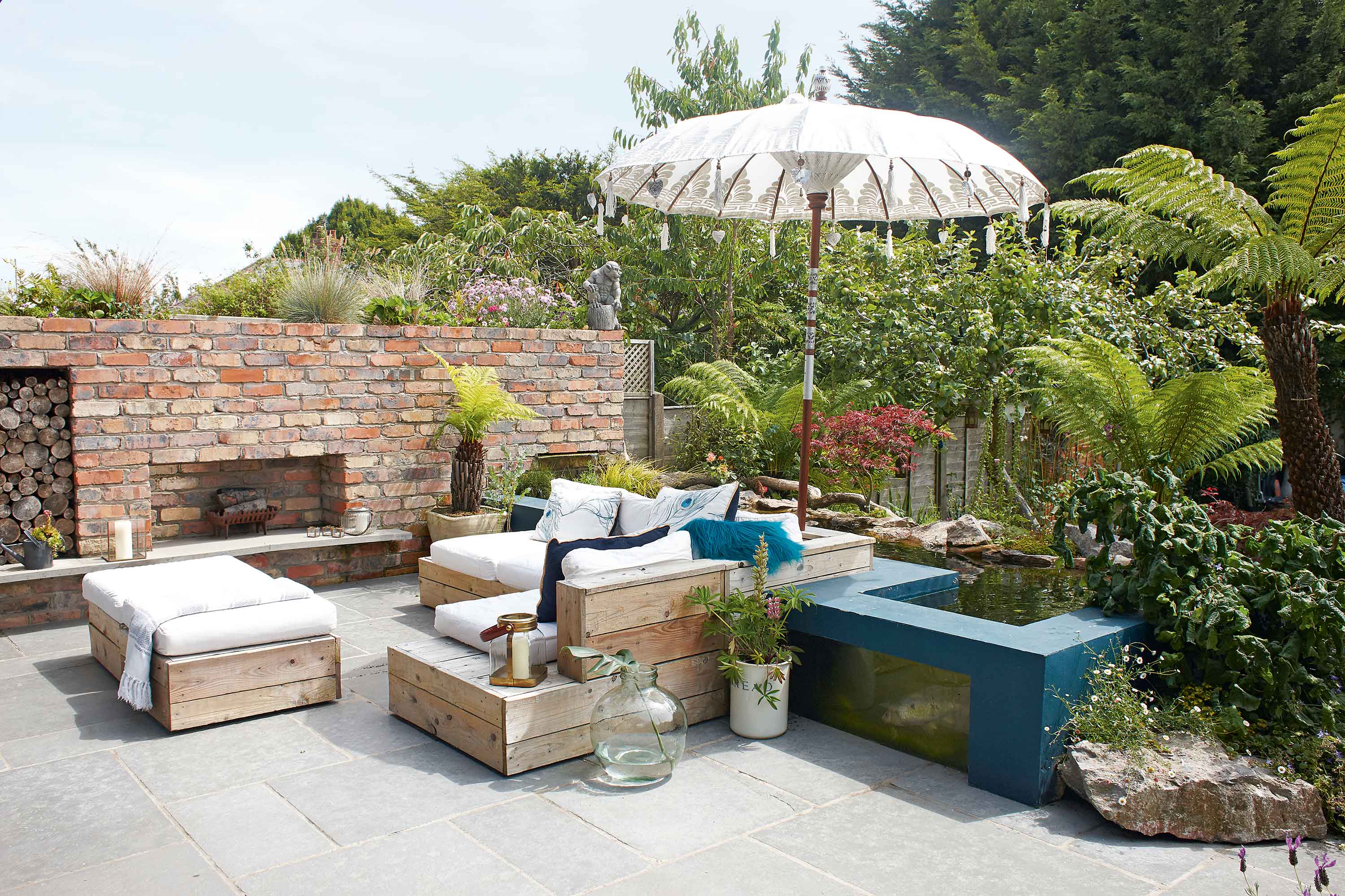
An urban spot is brought to life with a brick fireplace and functional seating
The best gardens act as an extension of our homes, to be used for relaxing with family and friends. And, this set-up goes to show that you don't need tons of fussy flowerbeds and acres of lawn to create a stunning scene.
The decorative parasol offers shelter from the midday sun, as well as providing a pretty focal point (check out our best garden parasols to grab one of your own). Meanwhile, the outdoor fireplace looks fabulous integrated into the brick wall and will keep everyone cozy as they lounge nearby. Hardy, drought-tolerant plants draw the eye upwards, softening the look.
Add a few potted plants and outdoor cushions and you've got the perfect place for easy indoor-outdoor living.
3. Turn an urban space into an easy-care oasis
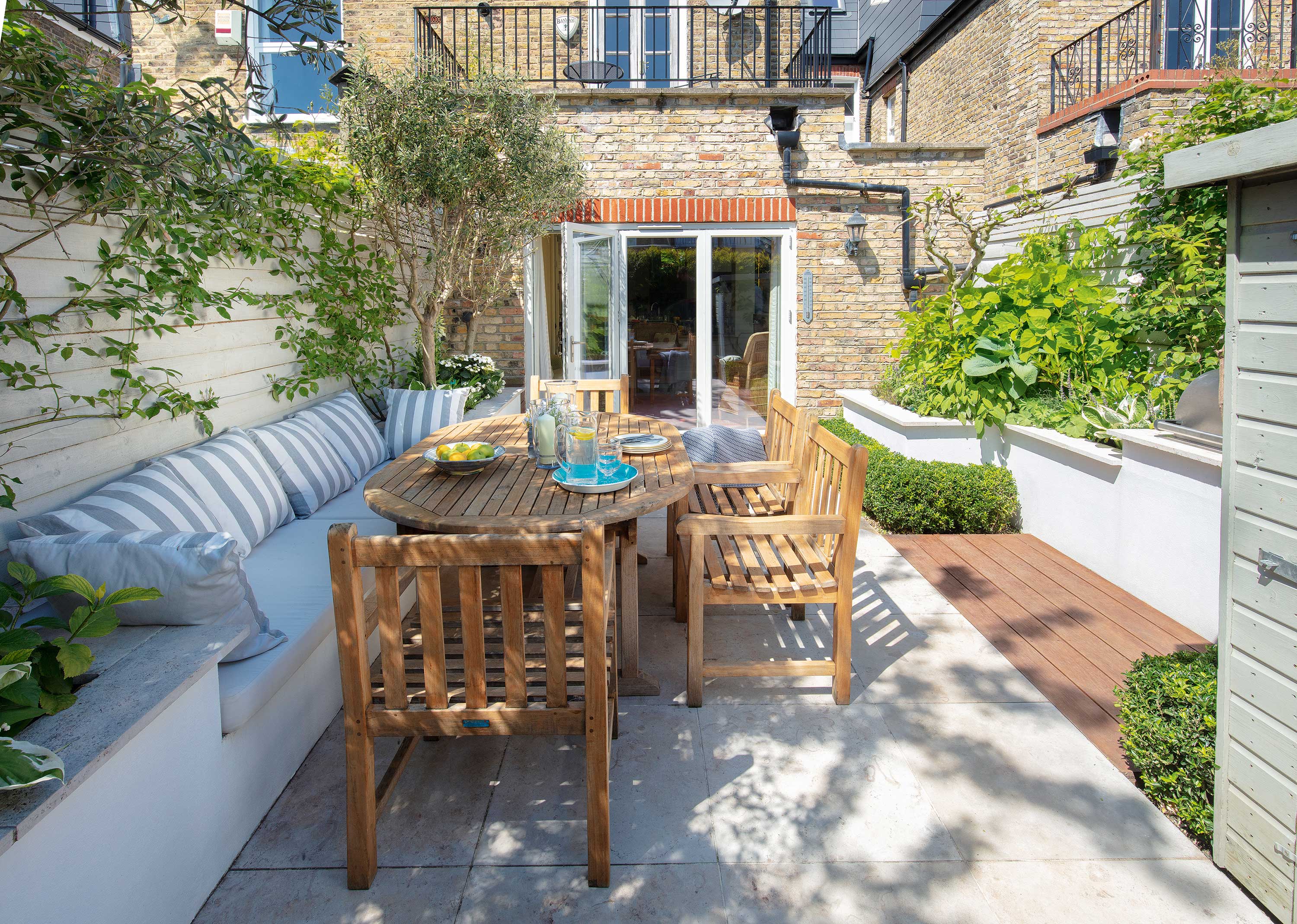
Double up hard landscaping as seating
If you're after some new outdoor seating ideas, then how's this for inspiration? We love how the hard landscaping offers function and structure, with the wall doubling up as a fuss-free bench.
By opting for a neutral color palette the space feels light and bright, whilst carefully considered foliage offers a burst of greenery to the scene. True, you'll need to clip the miniature hedges once in a while, but in a plot this size, it won't take long.
4. Embrace a natural look for your borders
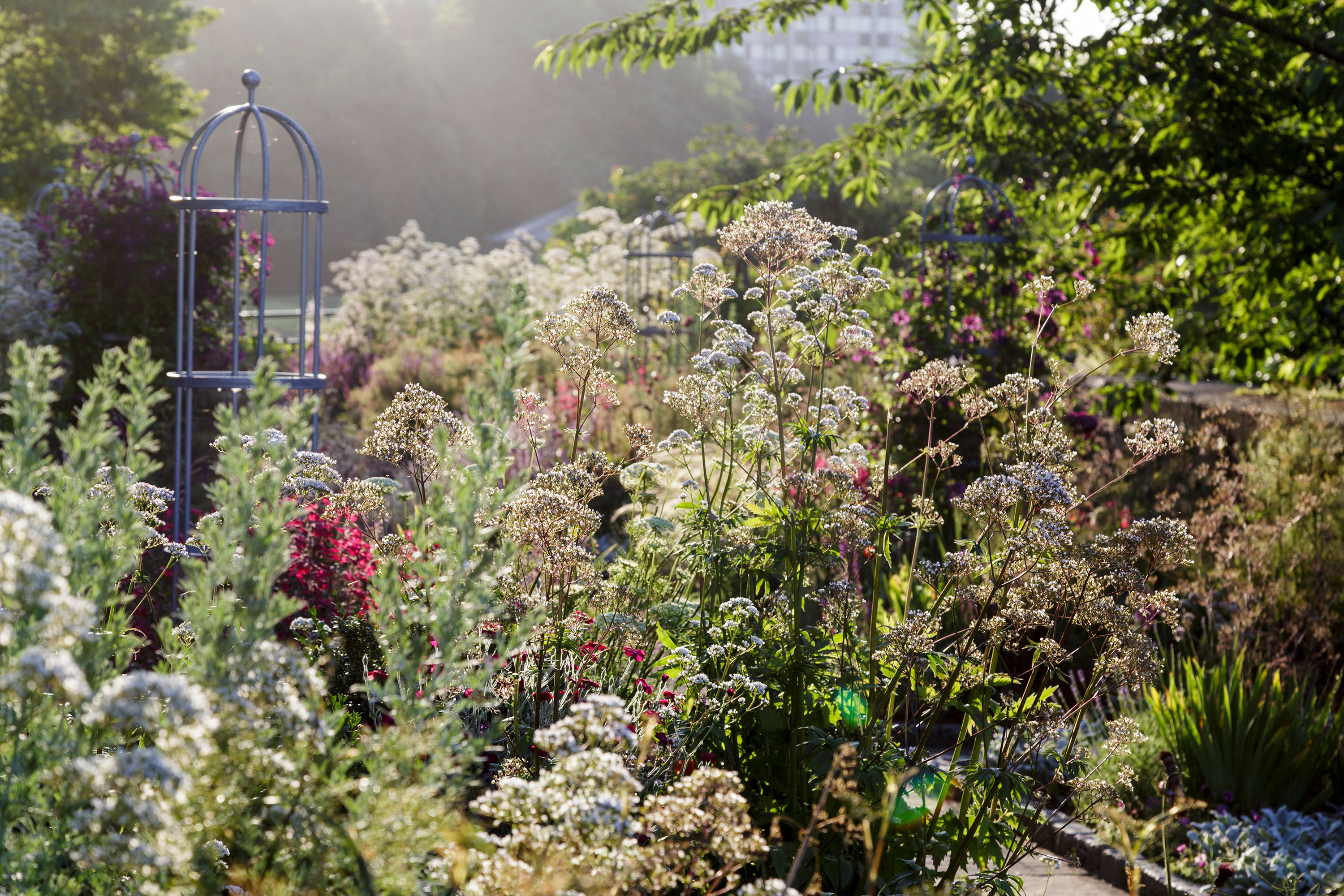
Embrace unruliness with soft, meadow-style planting
If you're a fan of flowers but don't have time for tons of weeding and pest control, then opt for a wilder touch for your low maintenance garden ideas. Billowing borders can look beautiful filled with a jumble of hardy meadow blooms and grasses. Plus, pollinators will love it.
Plant a handful of easy-care perennials such as echinacea, salvias, and achillea – all you'll need to do is cut them back at the end of the flowering season. Alternatively, simply scatter handfuls of meadow-mix annuals into a wilder patch of your plot, for a colorful summer display. Our guide on how to plant a wildflower meadow has all the advice you need.
5. Try weathering steel details
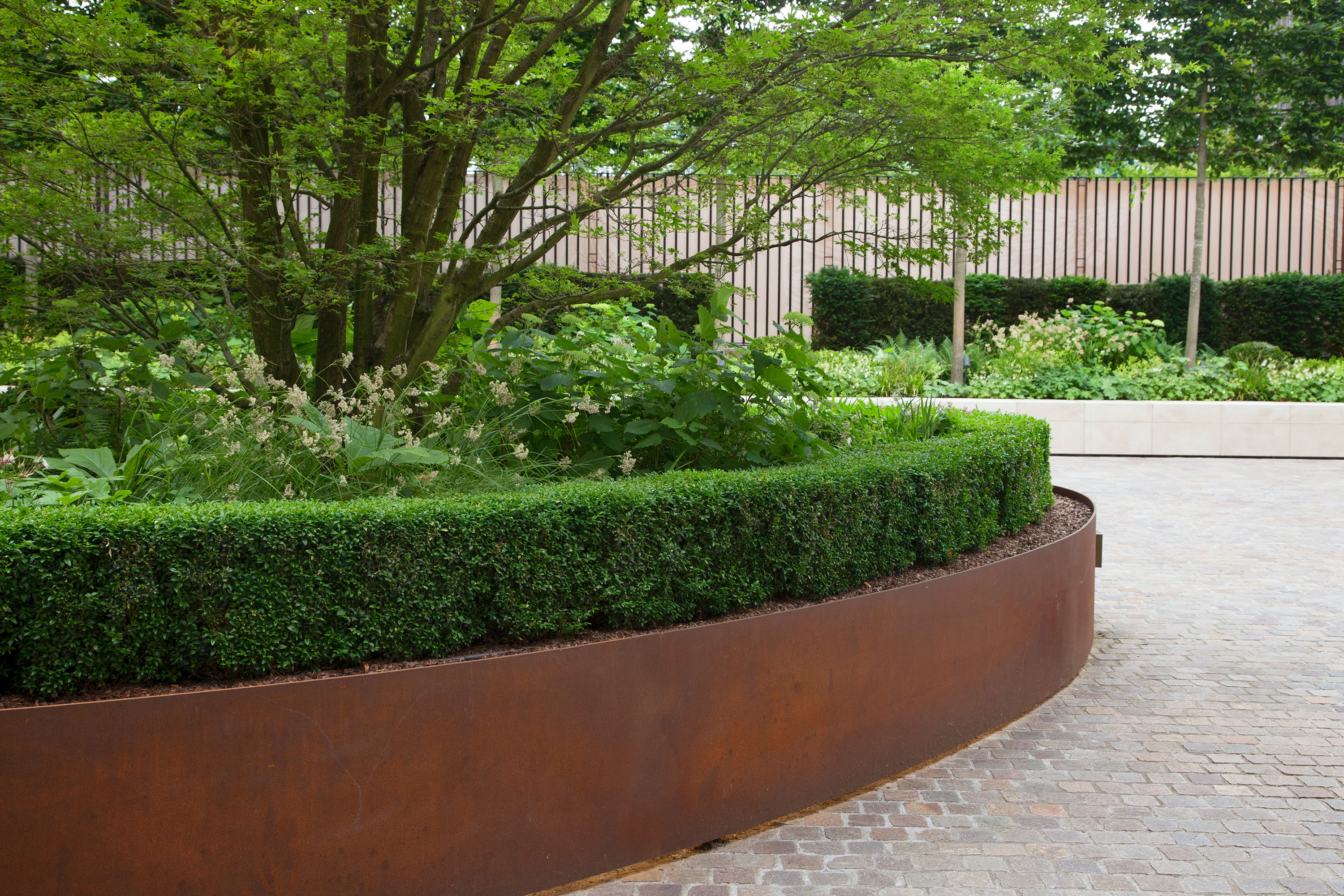
Weathering steel is built to last and makes fabulous edging for borders
Modern edging ideas are a great way to get a garden into shape, fast. But not only do they help to keep things in their proper place (gravel, mulch, etc), they can also look super stylish, too.
This example above is made of weathering steel – a stunning choice for all kinds of plots. And you don't need to maintain it as it's encouraged to rust – the layer creates a durable coating for the metal within.
6. Use a range of textures
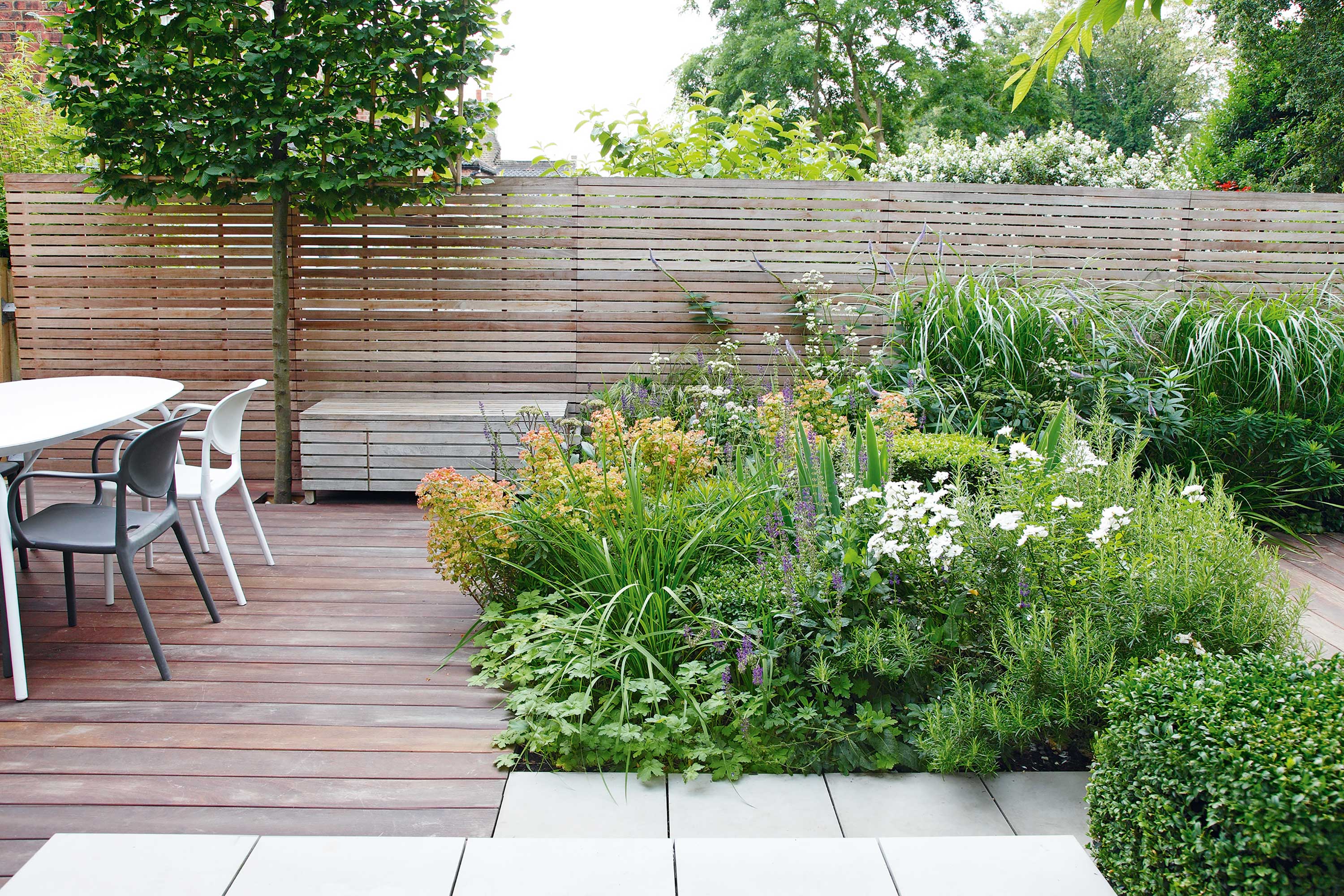
Combine panelled fencing, cool paving, and sleek decking for a stunning look
Hard landscaping often requires much less maintenance than lawns, hedges, and endless flowerbeds. It generally just needs a clean a couple of times a year, and, for wood, perhaps an annual coat of protective oil (our guide on how to clean decking has more tips).
But, if you're wary of things feeling clinical, then mixing up materials is a great way to add interest. This combination of fencing, decking, and paving looks clean and considered, yet it certainly isn't dull.
Create a contrast against sleek lines with luscious planting. Euphorbias and geraniums are great choices for low maintenance garden ideas, whilst rosemary will add a pop of green all year (plus makes a fabulously fragrant herb).
7. Use pared-back paving for a contemporary vibe
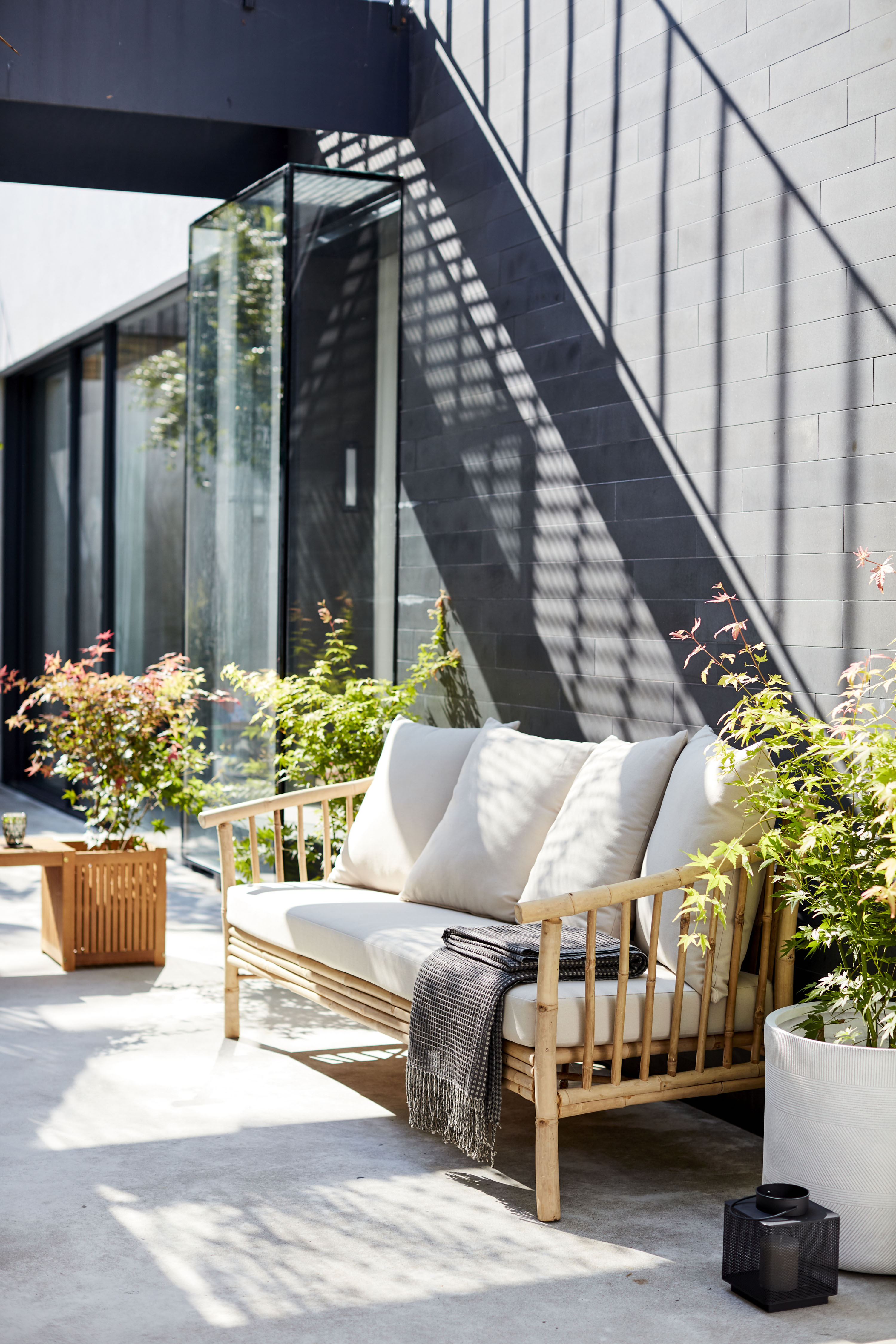
Low maintenance paving is chic and fuss-free
From porcelain pavers to natural stone slabs, paving adds a stylish surface to any garden, and is fuss-free to look after. Just take a look at our modern paving ideas to get inspired. We love how it creates a contemporary base for this comfy outdoor sofa and potted acers.
You will just need to give it a quick clean now and then, to prevent it becoming slippery over time. It's super simple to do, just take a look at our guide on how to clean a patio to find out more.
8. Raise up your beds
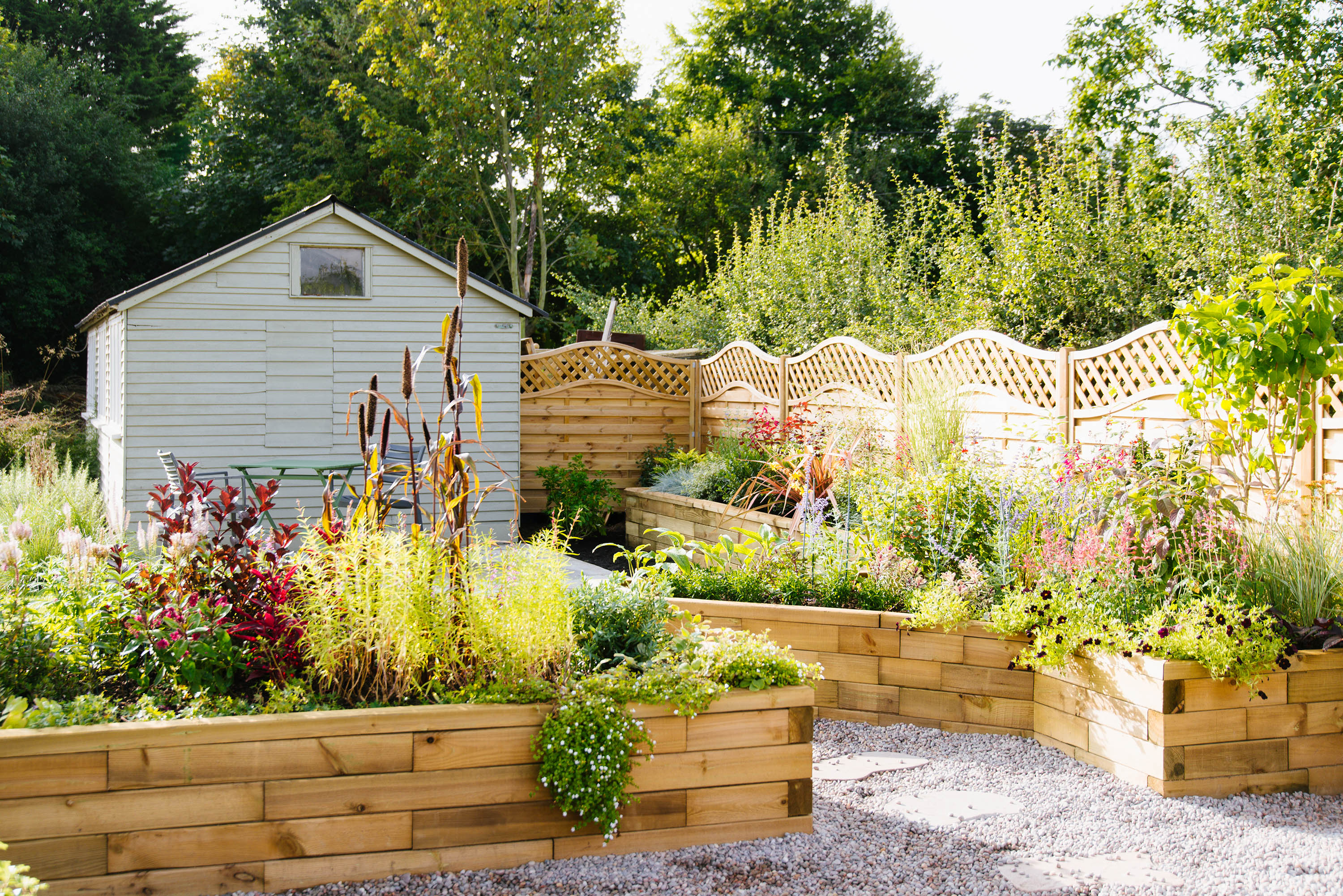
These raised beds from WoodBlocx make plants easier to access and are durable, too
'Switching from ground level beds and borders to raised beds will make planting, growing, weeding and watering instantly easier,' says Henry Blake, Managing Director of WoodBlocX. 'Build your raised beds at a height and width that suits you and your lifestyle and fill with fresh weed-free soil,' he says.
'Raised beds are also brilliant for landscaping sloping gardens, creating easily accessible tiers and can be customized to include seating, retaining walls and steps.' You can leave them looking natural, or paint them to suit your garden's style.
And if you're worrying about having to maintain the beds, then think again. 'WoodBlocX raised beds require zero maintenance, they will not crack, warp or rot and are guaranteed for 15 years,' Henry says.
Our guide on raised garden bed ideas has all the tips you need to get started creating your own.
9. Liven up the scene with a mix of containers
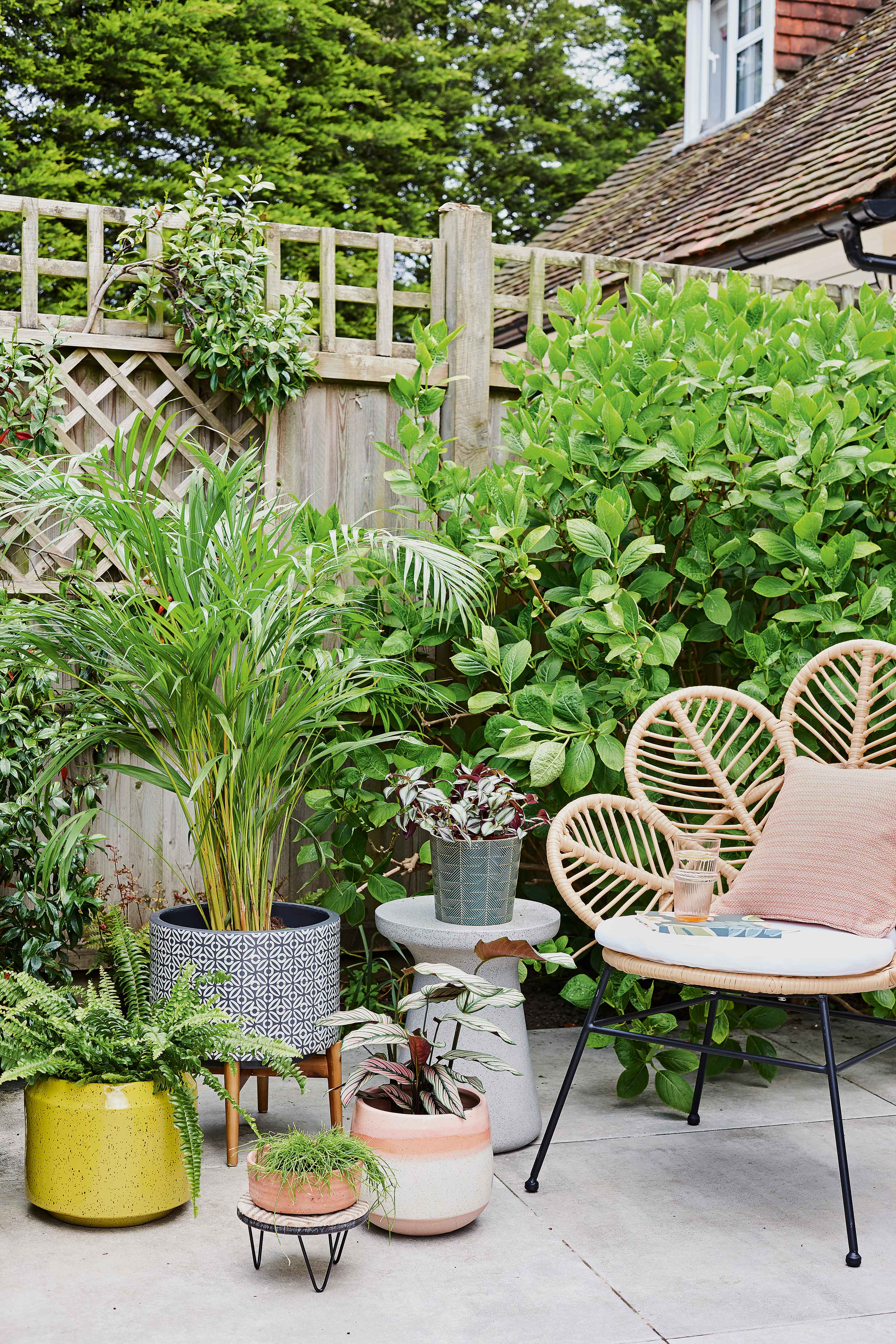
Container planting is a low maintenance way to add interest to a patio
'Patio pots, hanging baskets and window boxes are the perfect way to add color and interest to your garden and many plants simply need to be occasionally watered and pruned,' says Marcus Eyles, Horticultural Director at Dobbies.
'Container planting is ideal for compact spaces, plus there are a number of vegetables that can be grown in pots, meaning you don't have to wait for an allotment space to start growing your own home-grown produce. Mix and match pots in an assortment of colors and choose plants in varying heights to quickly transform your outdoor space,' Marcus says.
Sarah Squire, Chairman of Squire's Garden Centres, suggests 'add ready planted containers – all the hard work has been done for you! Simply place them by your front door or on your patio to give instant impact to your garden.'
Sarah also says to use large pots to make a real statement, and suggests using evergreen buxus plants to introduce shape and structure.
Don't forget that the actual containers themselves can be a stylish feature for any patio space – we've got tons of gorgeous designs in our garden planter ideas.
10. ...and arrange them up steps
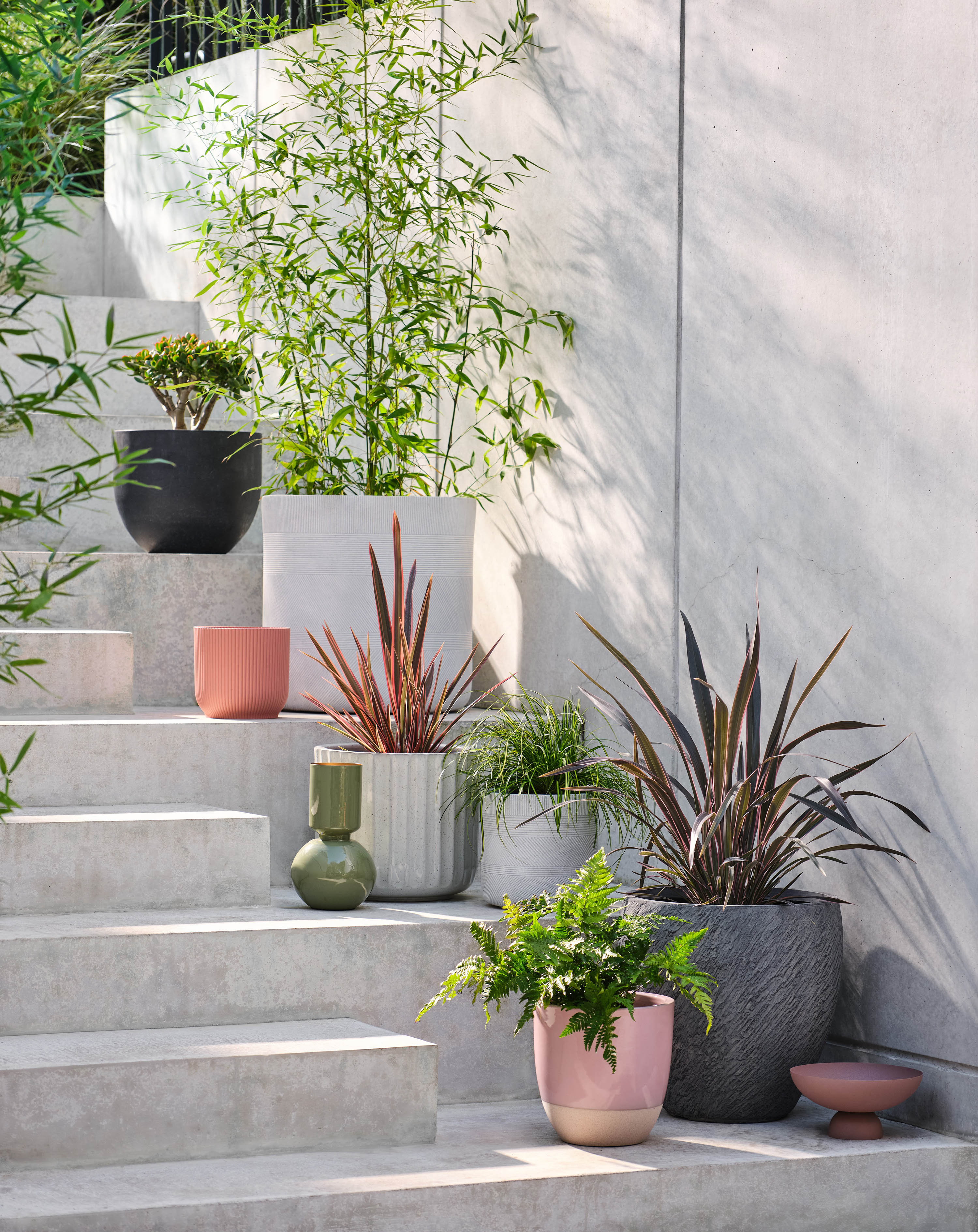
Breathe new life into lacklustre steps with a selection of pots
Of course, containers aren't strictly reserved for the flat parts of your plot – they're a fabulous way to liven up stone garden steps ideas.
We love how this contemporary collection draws the eye with its variety of textural foliage. If you want to recreate the look, just make sure to push them to one side, and remember they're there come nightfall to avoid tripping over any in the dark.
11. Give self-watering plant pots a go
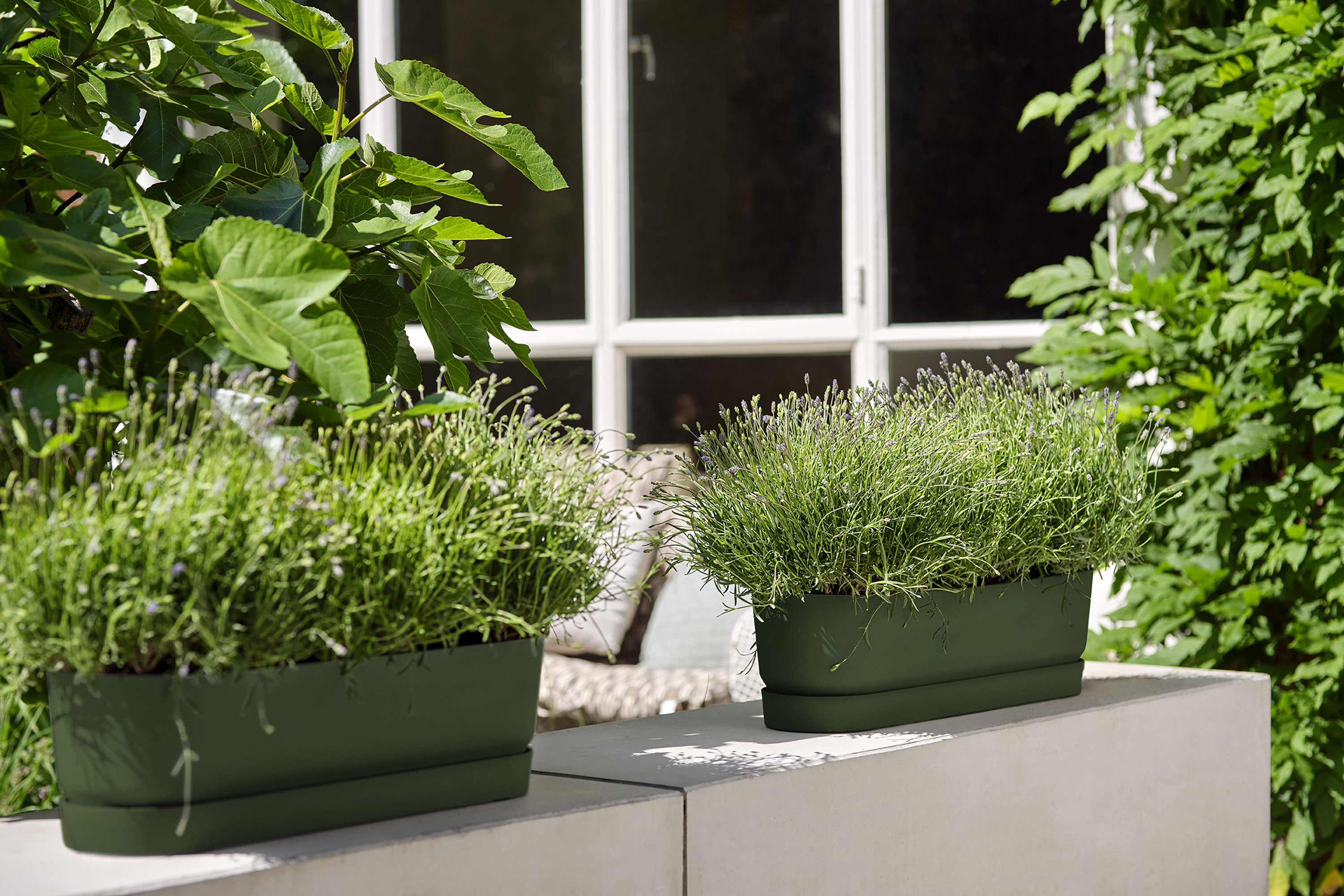
These Greenville trough (50cm) are from Elho
Love plants, but don't always have time to water? Don't worry, there's an easy-peasy solution – self-watering pots.
Complete with in-built reservoirs, these sustainable containers will allow you to enjoy your plants without reaching for the watering can so often, for fear of them drying out. There's no need to worry about overwatering either, due to their nifty design.
Narrow enough to fit on the smallest of windowsills or shelves, they're perfect for a miniature herb garden. But if you're looking for more planting inspo, our window box ideas has lots more lovely looks.
12. Go for garden-friendly art

Outdoor art from YARDART UK
Works of art aren't just for indoors. You can now find outdoor art available, which is a quick and fuss-free way to elevate your garden's walls.
These digitally printed pieces are totally weatherproof and durable, so are great picks for low maintenance garden ideas. We love how they add a focal point to the back of this border: simply attach them to your fence or wall with the study architectural bolts for a show-stopping look.
It's perfectly in keeping with this year's indoor-outdoor trend, plus is an easy way to add a touch of personality to your plot.
13. Invest in fabulous, weatherproof furniture
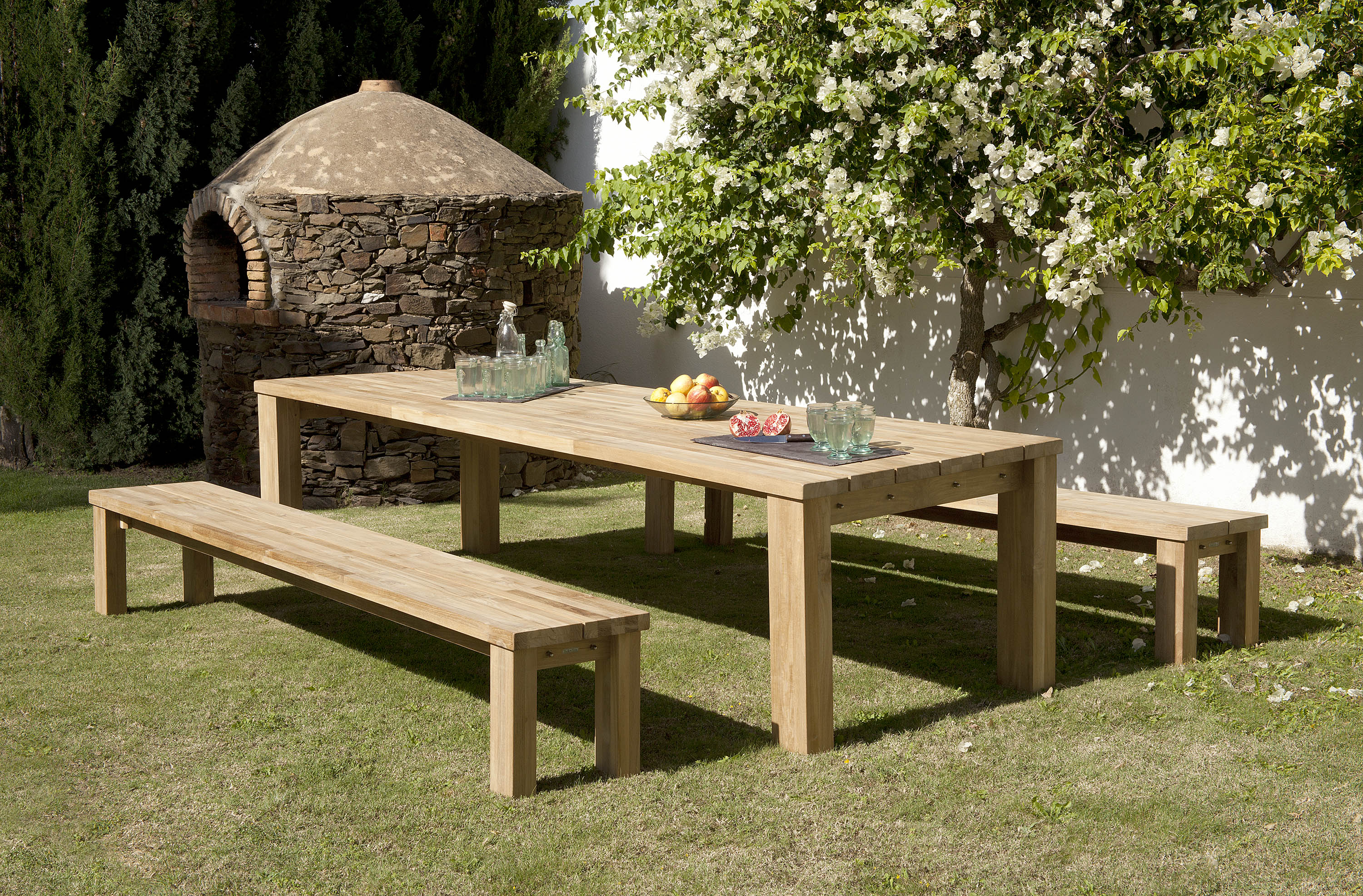
Barlow Tyrie specialises in low-maintenance teak furniture, which will last for years
'Invest in stylish new garden furniture and you'll want to stay outdoors year-round,' advises Sarah Squire of Squire's Garden Centres. 'Garden furniture made from weave or metal is very low maintenance as it can be left outside all year.'
Keep an eye out for teak outdoor furniture too. There are plenty of low maintenance and weatherproof varieties available, and it has a beautiful, pared-back finish.
'It's well known that teak acquires an attractive silver patina over time, due to the action of sunlight. It's a reason many customers choose the material,' says Peter Tyrie, Managing Director of Barlow Tyrie.
'However, if your furniture is new and you want to retain its original "honey" color, then you should use a Color Guard before it changes,' Peter continues. 'There are various different treatments and teak oils available on the market, which will inevitably stain your furniture. So, unless you want your furniture to turn a very dark and unattractive color over time from multiple applications, avoid.'
Fancy treating your outdoor space to something new? Our best wooden garden furniture buying guide is full of fantastic ideas.
14. Opt for solar-powered lighting
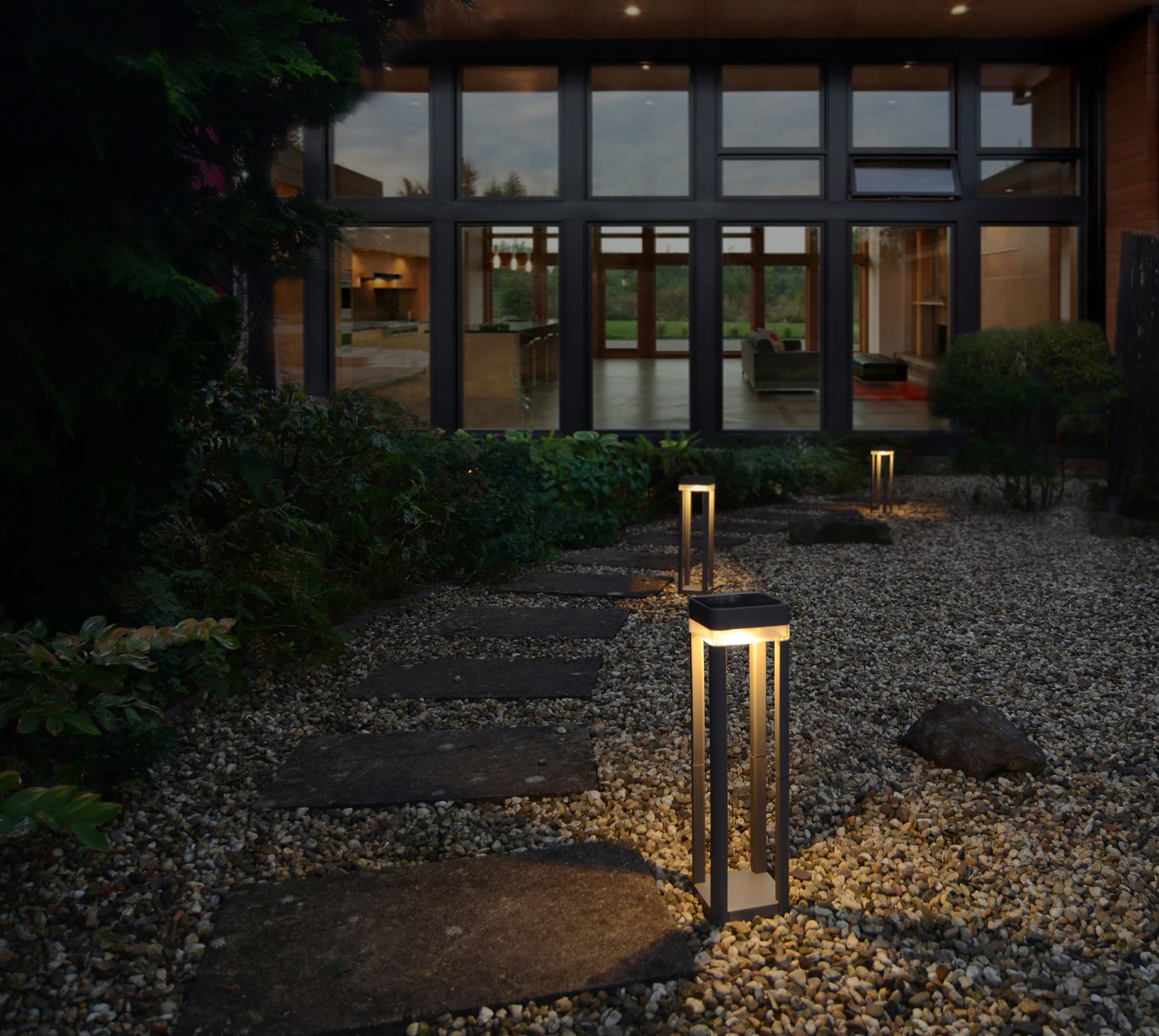
Good lighting is crucial when it comes to upping your garden's ambience. Plus, come night-time, it's important for seeing what you're doing and where you're going. But, if the idea of heavy-duty wiring puts you off, then why not consider an alternative...
'Solar powered outdoor lighting is a fantastic option for a low maintenance garden when you want to illuminate a walkway,' says Jamie Moxey, Design Consultant at Dusk Lighting.
'The energy-friendly option has been developed significantly over the years and there are now many affordable choices – there are now products which are both solar powered and motion-activated, with no external wiring required.'
'These elements mean the light can be fixed to any suitable surface to illuminate your path and you never need to worry about turning the light off when you come back into the house.'
Our best solar lights buying guide has lots more lovely designs.
15. Go for a low maintenance lawn
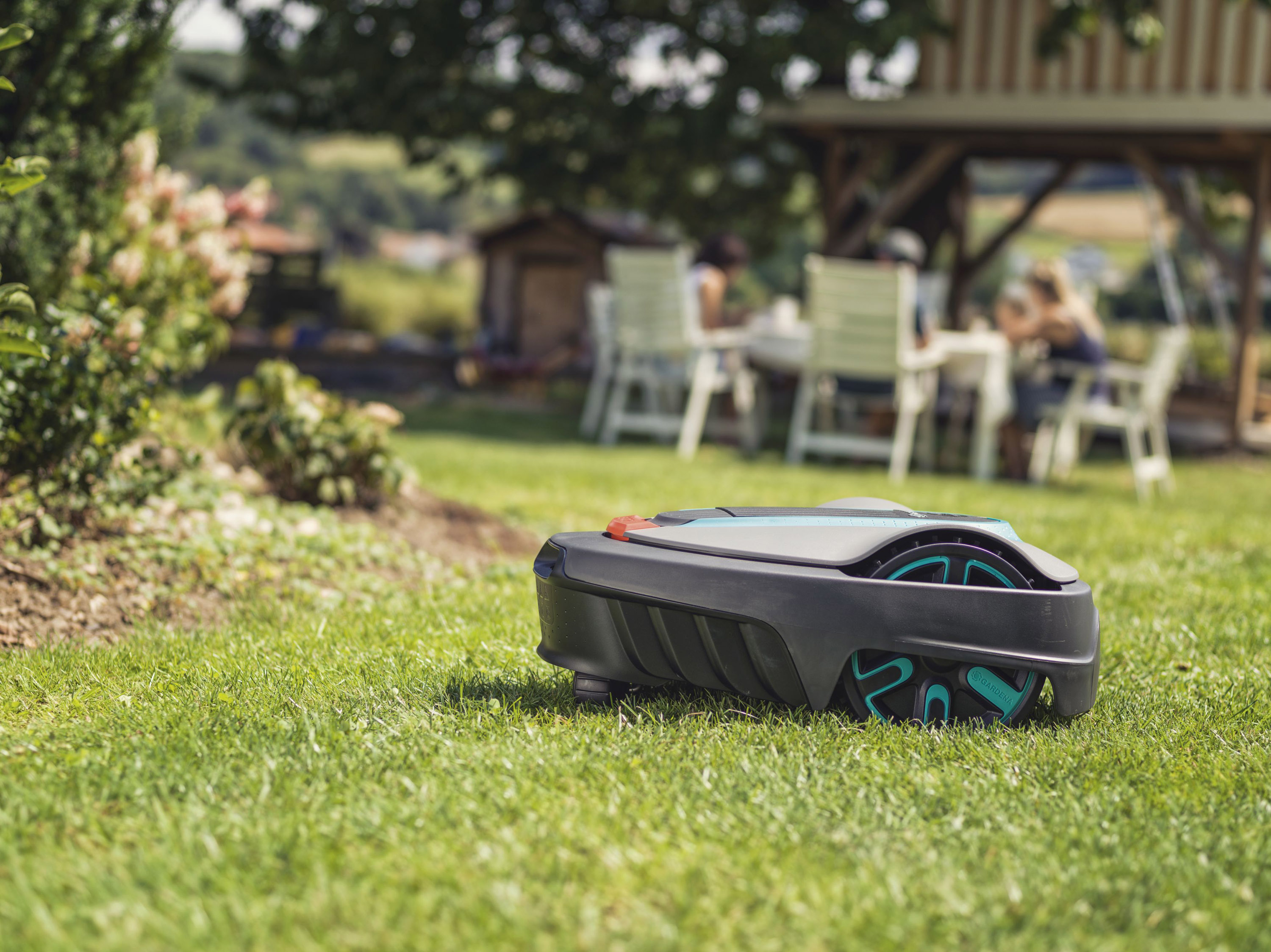
Gardena’s Smart robotic mower is extremely quiet and will work in all weathers
Keeping a lawn looking good is arguably the most time-consuming of all garden jobs. But, you could consider having just a small area of short grass in the most formal area of garden and leaving the rest to become wilder and more natural – take a look at Chris Packham's lawn advice, for example. All you then need to do is mow it just once a year at the end of summer.
Replacing fine turf or very poor grass with a hard-wearing seed or turf mix is a possibility too. Both high-quality turf and very poor turf need aerating, scarifying (find out how to scarify a lawn in our guide), feeding, and regular mowing to keep them looking good. However, more durable lawn mixes labelled as 'amenity', 'multi-purpose' or 'hard wearing' are much more able to look after themselves.
Or how about a green alternative to grass that always looks neat and never needs mowing? A sedum, thyme or even a chamomile lawn are all worth considering and are tough enough to be walked on. They are hardy too, so will look good all year round.
If you do want to keep your whole lawn area regularly mown and you don't mind splashing out a little, one of our best robot lawn mowers will do all the work for you. It can be programmed to head out at pre-set times, before taking itself back to its charging station when it's finished. You don’t even need to be at home at the time.
16. Try adding gravel
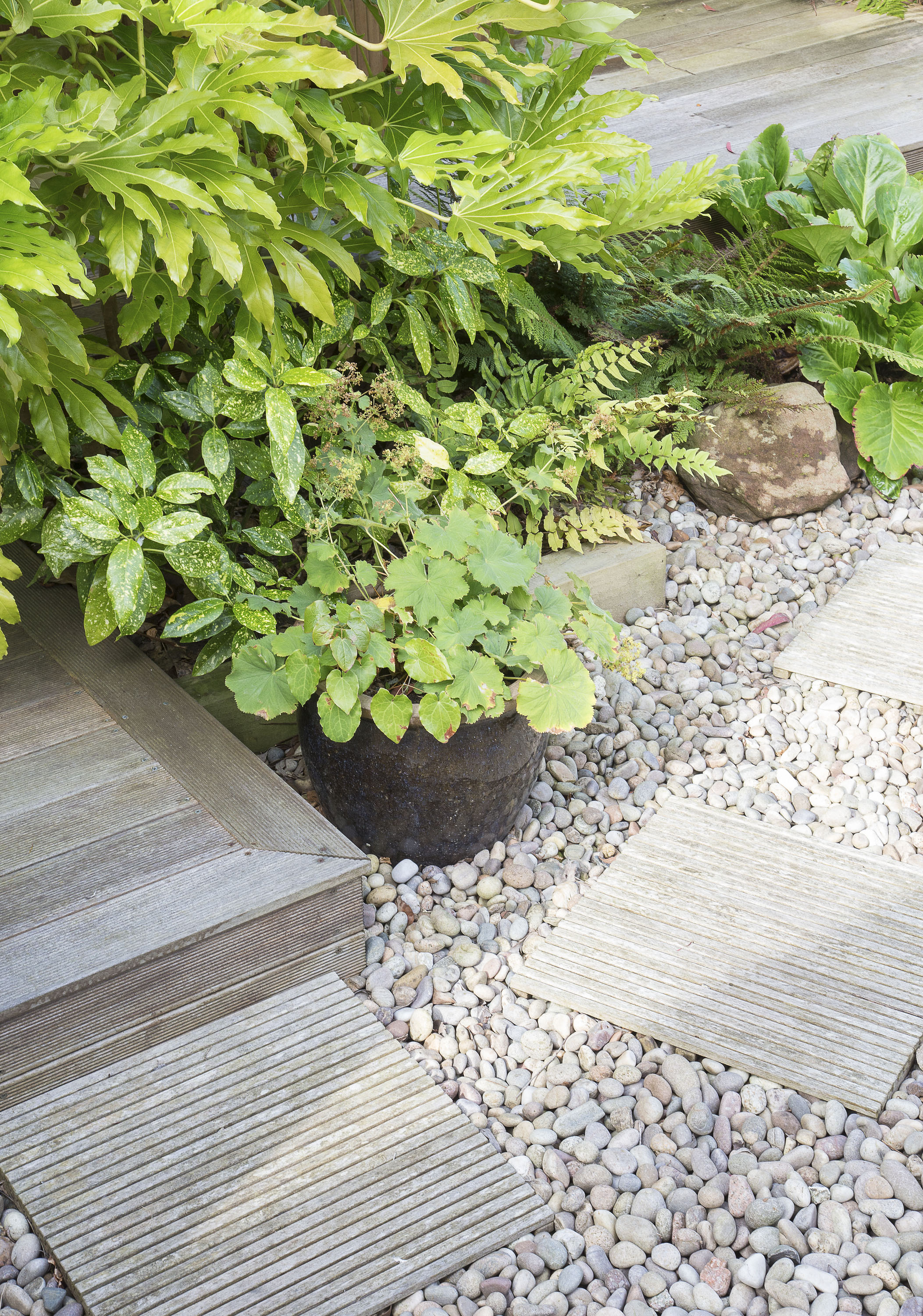
Gravel is an affordable and functional ground cover
If you decide to replace your lawn with hard landscaping, be sure you choose a permeable surface that allows rainwater to drain away safely. This is especially important in front gardens, where there are now laws that restrict how much of the space can be changed to hard landscaping (this is to ensure less surface water drains onto roads, potentially causing flooding).
Garden gravel ideas are a good, low-maintenance option for attractive, permeable hard landscaping and can look wonderful with sun-loving plants in or around them. But be sure to use a weed-suppressing membrane underneath it to ensure upkeep is minimal.
17. Pick drought-tolerant plants
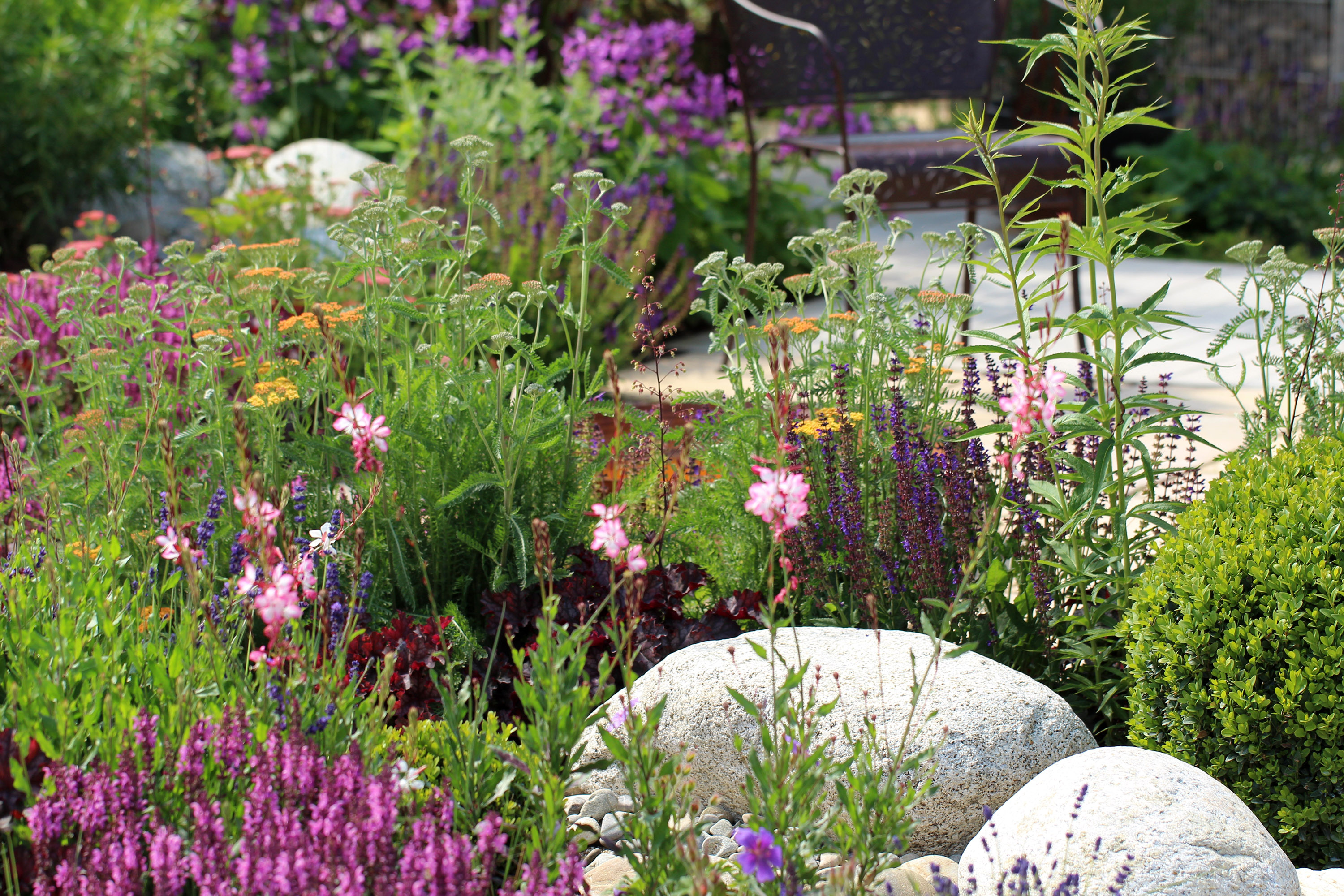
Try alpines and succulents for low-maintenance appeal
Even the keenest of gardeners will admit that having to water once, and sometimes twice a day at the height of summer can become very tedious.
However, if your garden soil tends to bake dry, as often happens with clay, see it as a plus point rather than a negative. Instead of trying to keep it moist, fill it with drought-tolerant plants that will thrive without additional watering instead – try eryngiums and lavender, for example.
Our small rock garden ideas feature suggests more plants that will happily live in slightly drier conditions – perfect if you're after low maintenance garden ideas.
18. Add an automatic sprinkler
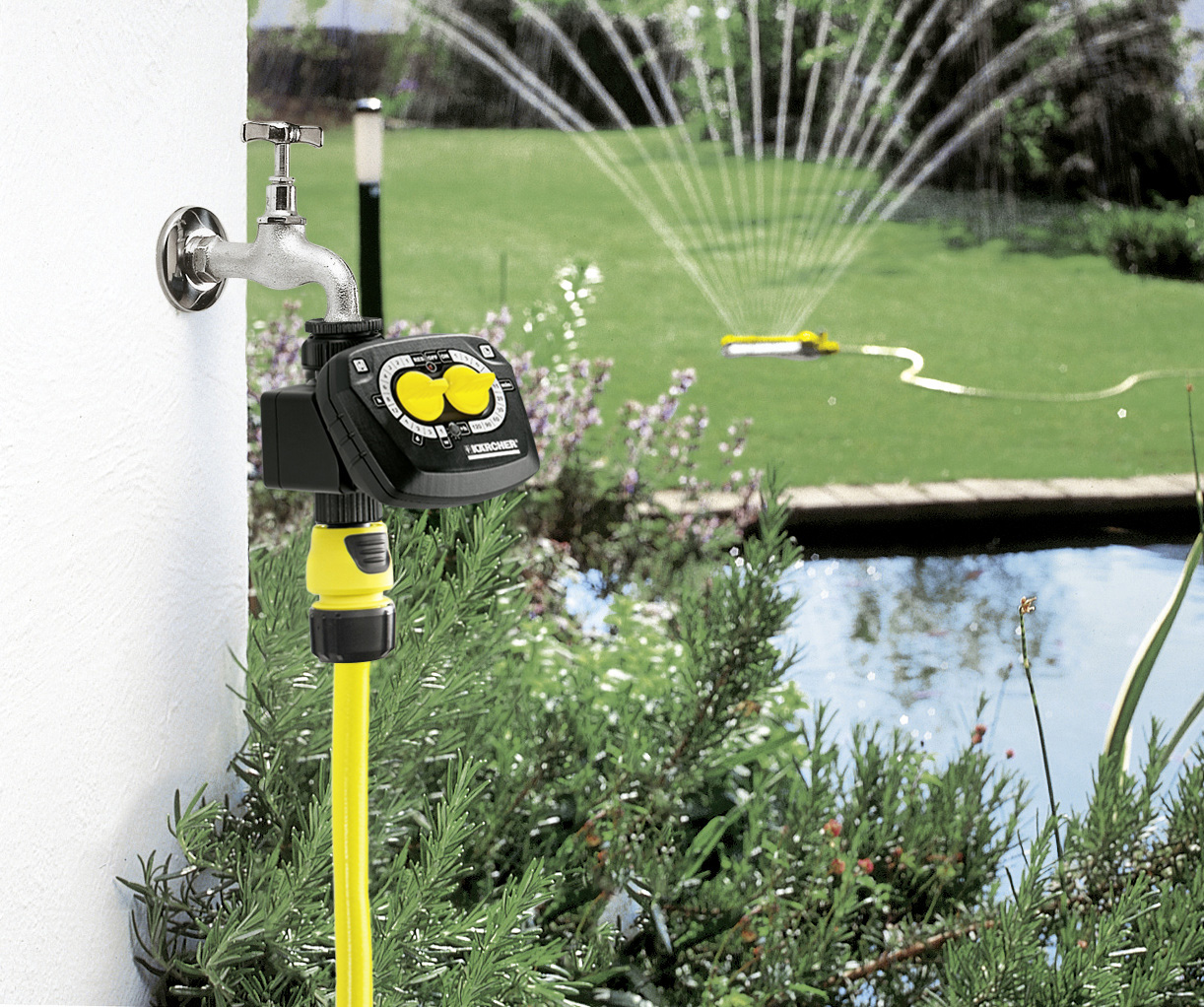
The easy-to-programme Kärcher Watering Unit WT 4
If you do have some plants that need watering on a regular basis, installing an automatic watering system could save you hours of time every week. Plus, it'll help cut down on the amount of water that gets wasted.
Kärcher, best known for its pressure washers, have a good range of auto-watering devices. Watering starts and stops automatically at preset times, and the water won't flow unless it's actually needed, so there's no waste.
19. Try recycled plastic for your boundaries
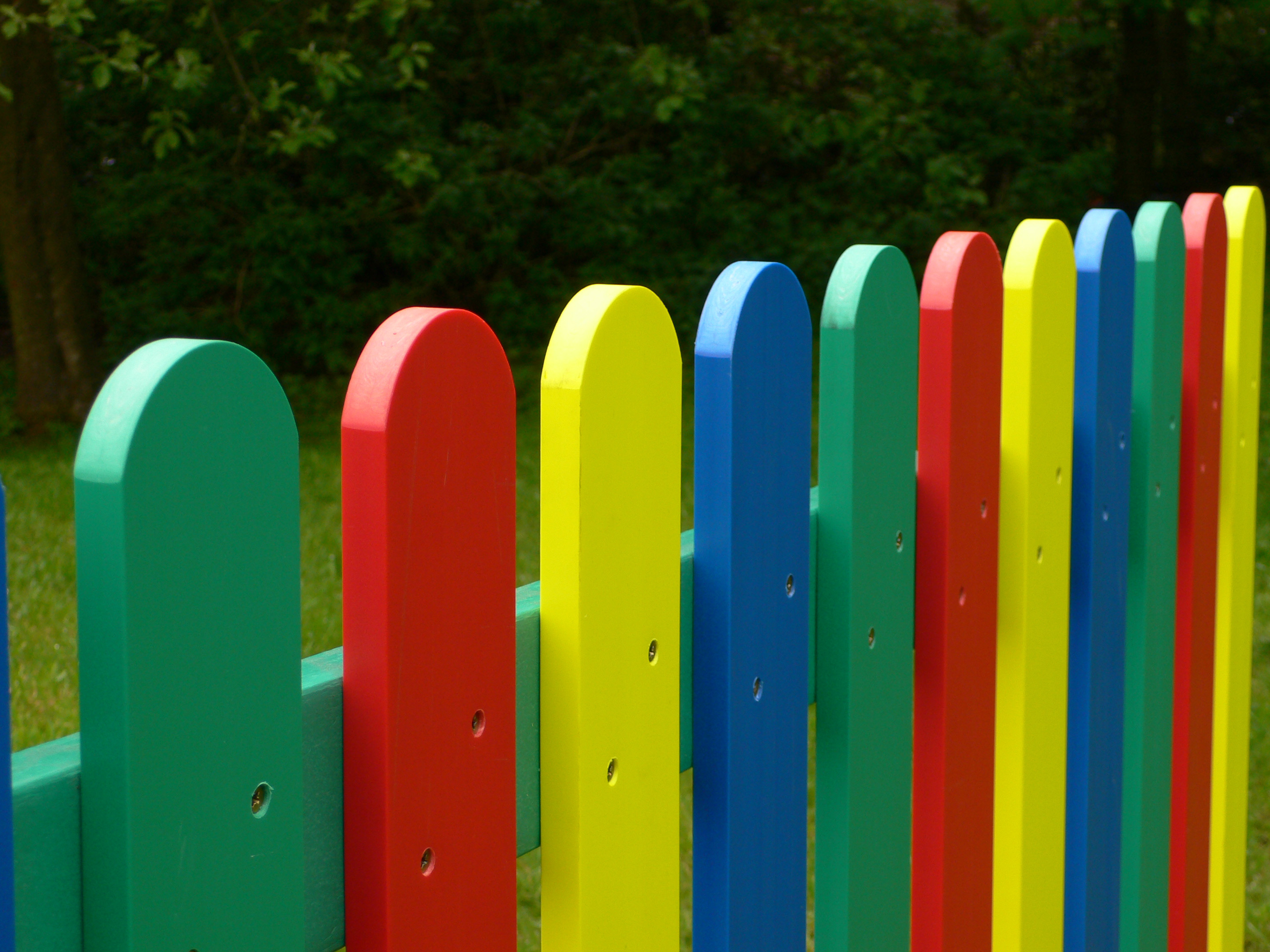
If you have a wooden fence around the perimeter of your garden, it will need treating and/or replacing every few years to keep it looking good and to prolong its lifespan. But, there are other options that are virtually maintenance-free. Take these recycled plastic fence pales, for example, which are available in bright colors as well as in more traditional black and brown.
A hedge can make a very environmentally friendly perimeter. And, if you choose a slow-growing species – such as holly – just a very occasional light clipping will be enough to keep it in check.
Avoid fast-growing species like leylandii at all costs, or you'll find yourself with hedge trimmers constantly in your hand. Although, if you do need replacements, you can find our best hedge trimmer picks in our guide.
20. Deck it out
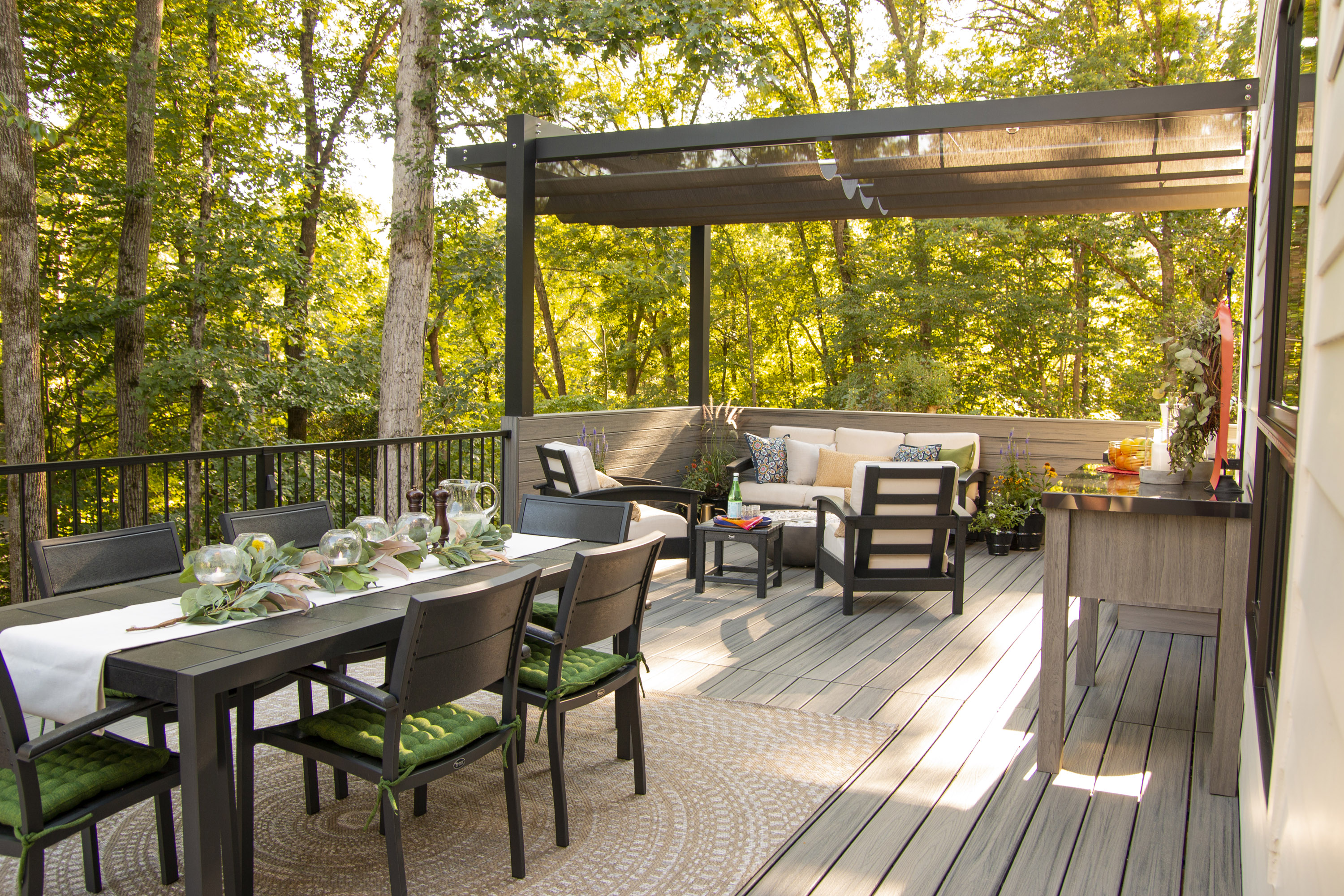
Decking is a popular and low maintenance choice
Decking makes an attractive, hard-wearing surface for seating areas and is a good replacement for labor-intensive patches of lawn. But for the ultimate low maintenance deck, opt for wood-lookalike composite varieties.
Trex decking, for example, is manufactured from recycled material, and resists fading, staining, scratching and mould. It won't rot, warp, crack or splinter and just a simple soap and water clean every now and again is all that's needed to keep it looking like new for years.
We've picked out our other favorites in our best composite decking buying guide.
21. Give your borders an edge
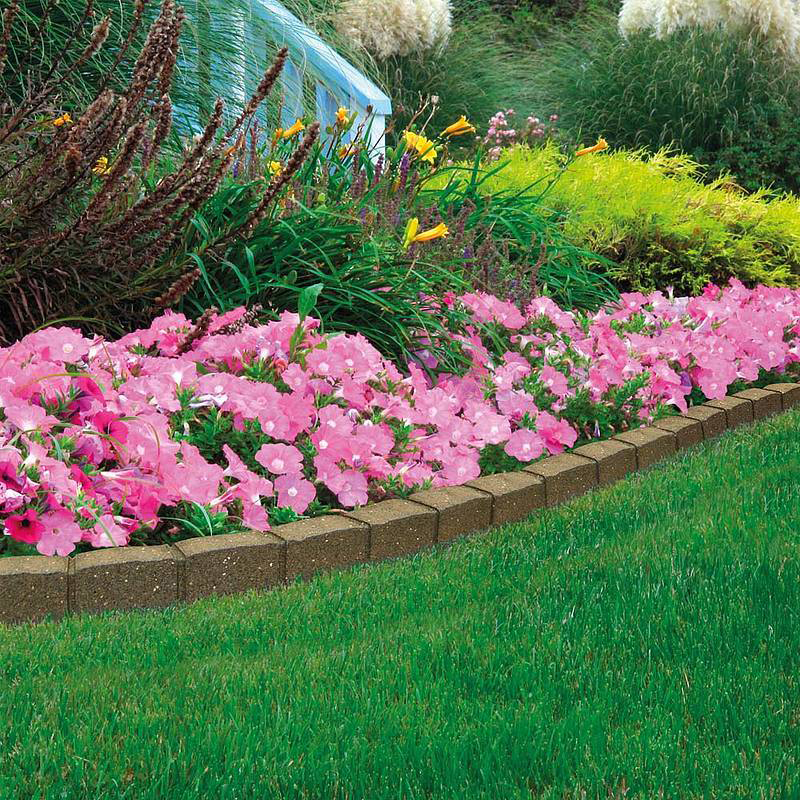
Roman stone effect border from Waltons
Nothing makes a garden look tidier than neat edges – in fact, you can get away with no end of untidiness in the borders so long as the edges are neatly trimmed! But edging with a strimmer or half-moon spade takes a lot of time, and life will be a lot easier if you install permanent edging that you can mow right up to or over.
These days, there are lots of styles and materials to choose from, just take a look at our lawn edging ideas for starters. This one above, for example, is made from recycled tires and allows you to install it in either straight lines or curves.
22. Right plant, right place
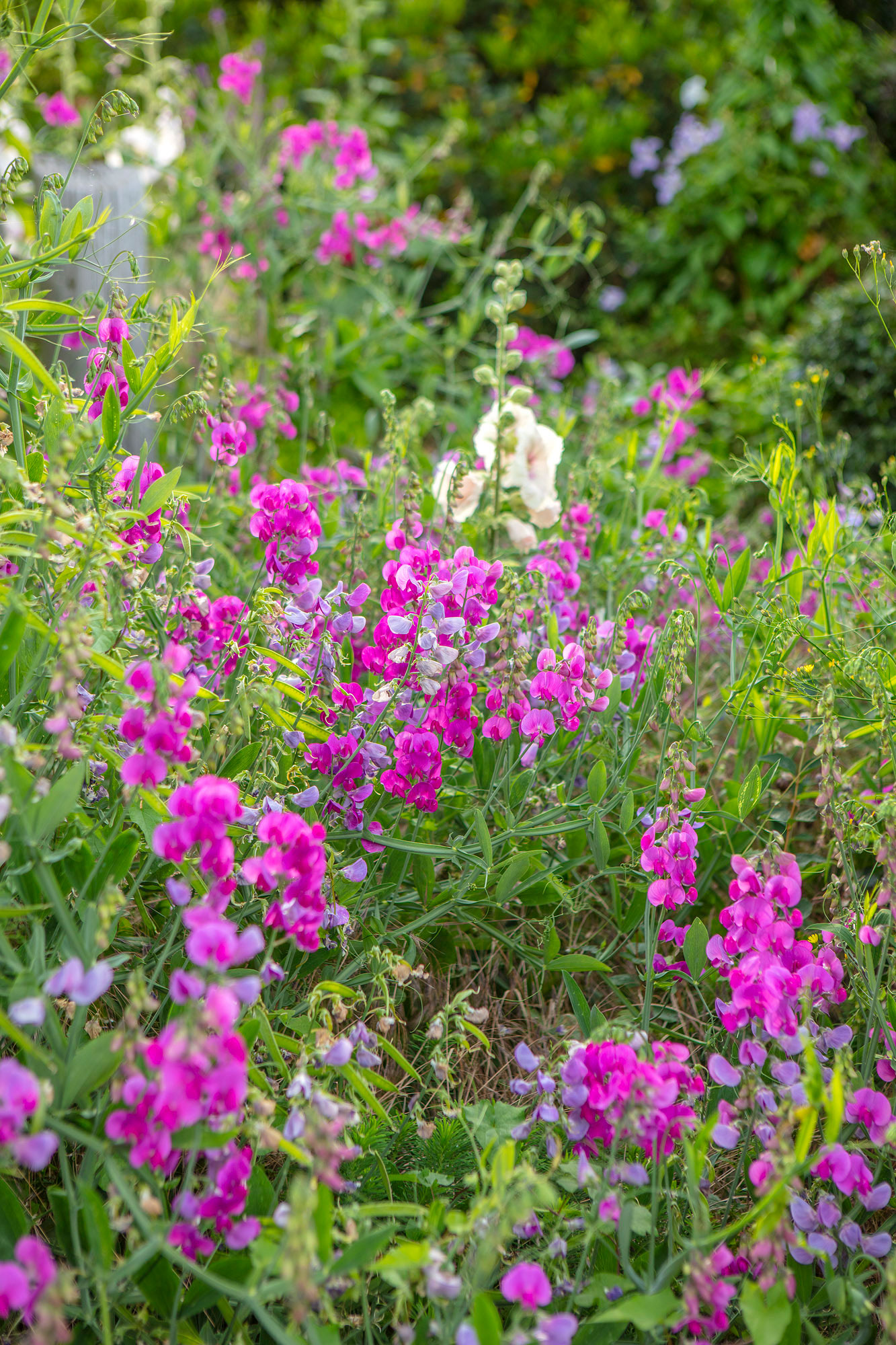
Give your plants the environment they need
A plant that's happy because it's planted in conditions that suit it perfectly will need far less cosseting. So, it will take up far less of your time than one that's struggling to thrive in a less-than-ideal situation. Establishing what sort of soil you have before you choose plants is vital (remember that even in the same garden, this can vary from one bed or border to another).
You may have clay or sandy soil, and it may be acid or alkaline – all of these determine the most suitable plants to grow in it. Our guide to soil types will help you check the conditions of your plot.
And, when you're thinking of investing in new plants, be sure to check their eventual height and spread too. Constantly having to cut them back to keep them in their allotted space is a huge time-waster: not ideal if you're looking for low maintenance garden ideas.
23. Simplify your planting palette
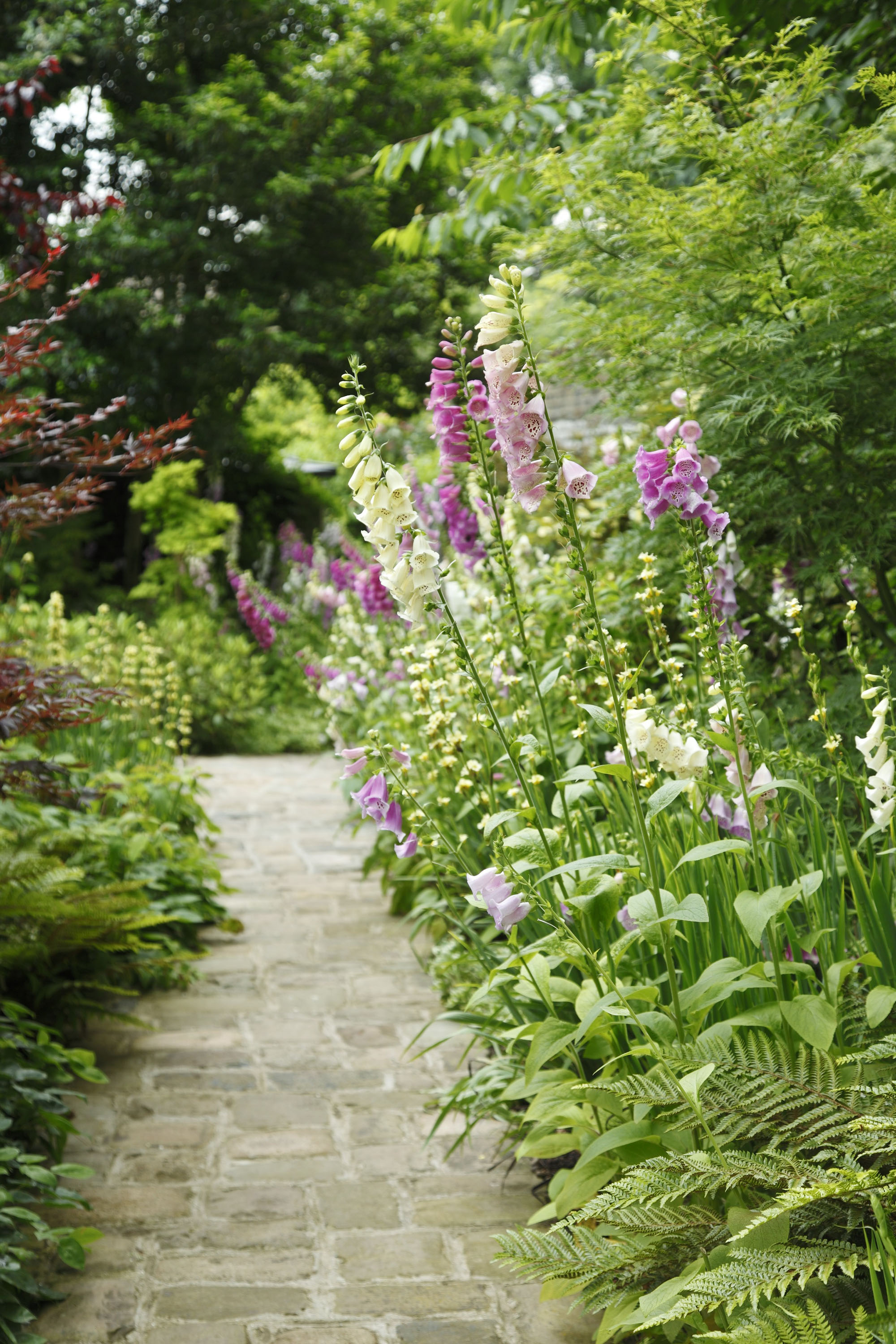
Pick a handful of plant varieties, from a spectrum of complementary hues
Including a huge range of different plants in every border is inevitably labor intensive. This is because each one will need your attention at a different time, whether that's for staking, deadheading, pruning, or disease and insect control.
Instead, go for a restrained planting palette, with swathes or drifts of the same species or variety repeated though the border. Not only will it look fantastic, but it will also allow you to deal with all the plants in one fell swoop.
24. Go green
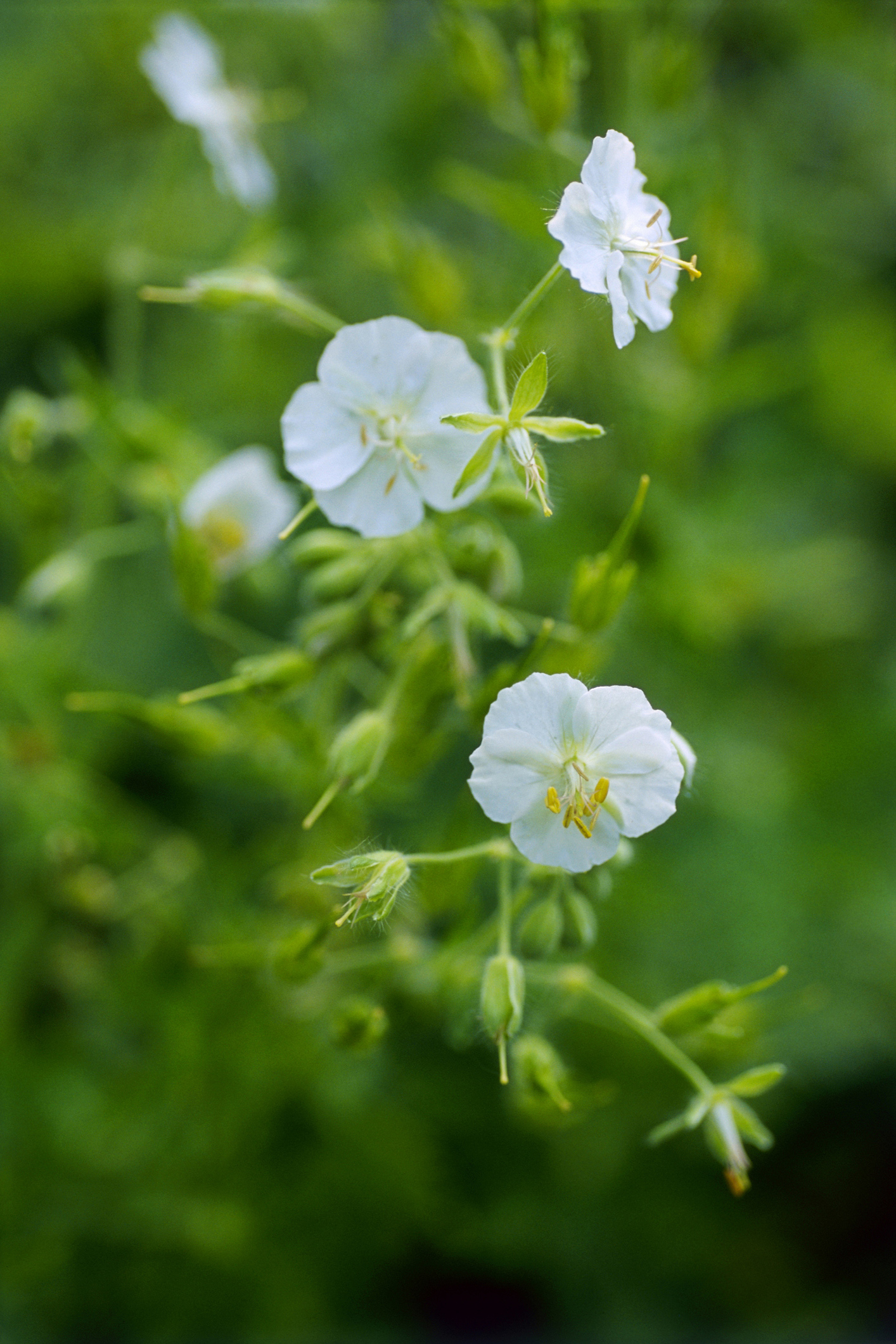
Try geranium phaeum 'Album' for a good low-maintenance perennial
No plant can be said to be entirely maintenance free, but evergreens certainly come close – and a border full of lush evergreen plants can look amazing.
Try jungle-like Fatsia japonica, for example, or dainty Euonymous fortuneii. To keep things interesting, mix in some low-maintenance perennials like hardy geraniums. Geranium macrorrhizum 'White-Ness' looks especially good against a backdrop of dark-leaved evergreens.
25. Choose low maintenance shrubs
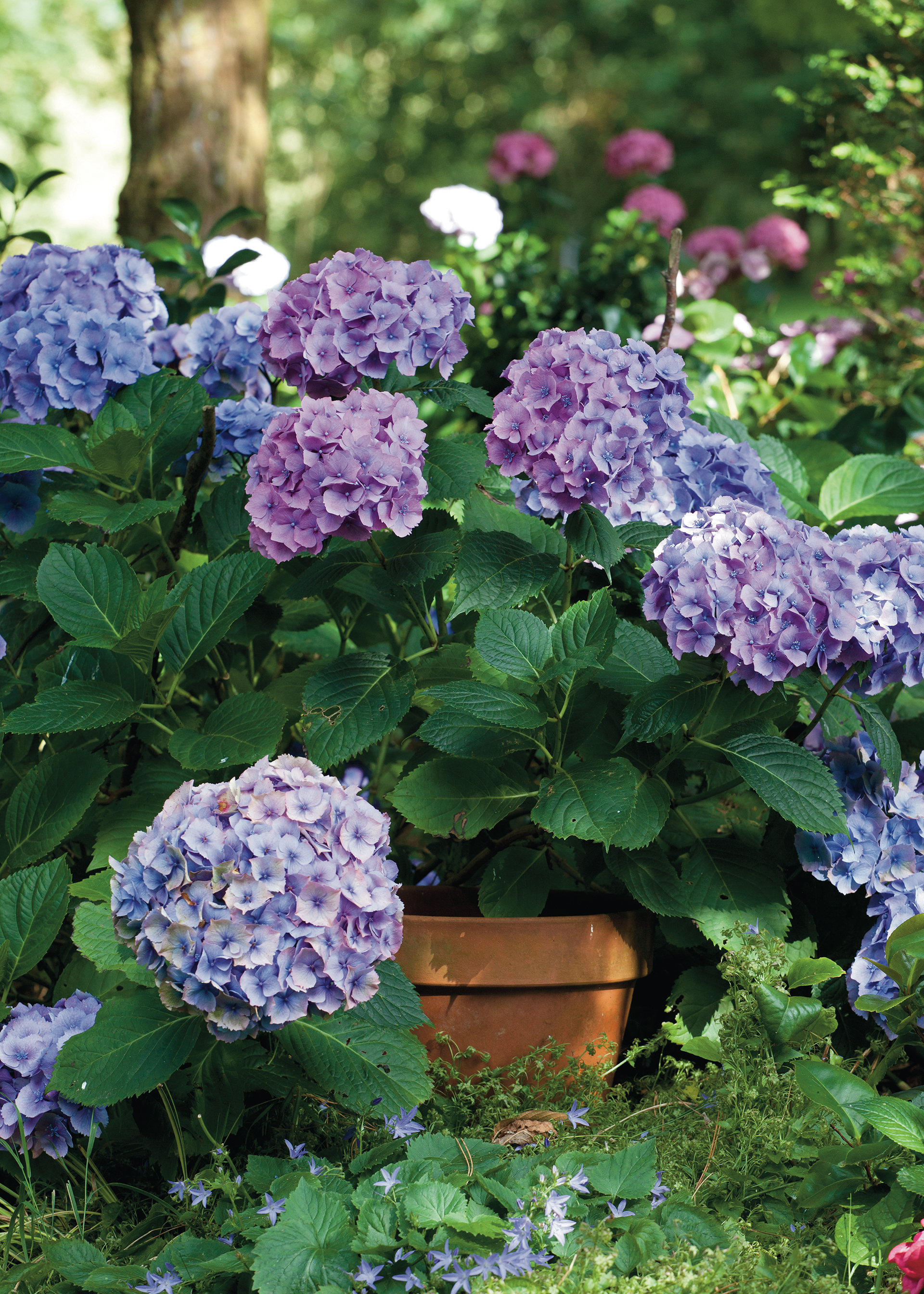
Hydrangeas love partial shade but need some sun
Of all the plants that you could include in your low maintenance garden ideas, shrubs are the ones you are more likely to be able to put in and more or less forget about.
Once they're established, shrubs will usually only need watering in the very driest of summers, if at all. Other than that, an occasional light pruning will be all that's required.
For amazing summer scent in a sunny part of the garden, you can't beat Philadelphus 'Belle Etoile', while hydrangeas (now very fashionable again) are perfect for shady spots. For super-size flowers that last right through summer, go for 'Annabelle'.
26. Remember to mulch
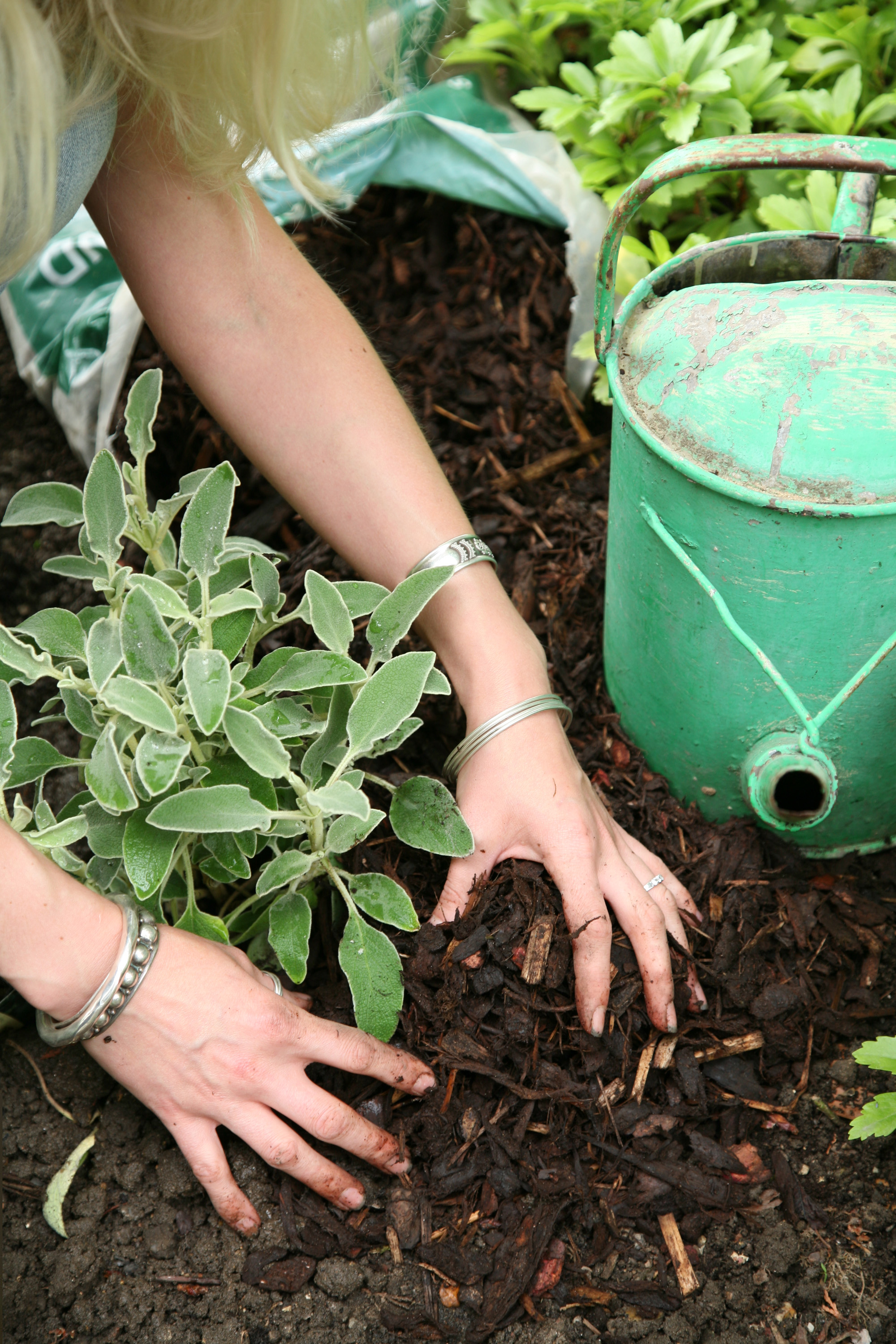
A good layer of mulch will keep weeds at bay
Weeding can be one of the most soul-destroying of garden tasks, but there are two key ways to keep them at bay. One is mulching – laying a thick layer of well-rotted manure, garden compost, leaf mould or composted bark around your plants. As well as locking in moisture, a mulch also blocks the light, meaning that weeds won't come to the surface – we have a handy ultimate guide to mulching if you want to know more.
The other key to a weed-free garden is dense planting – where there's a plant, there won't be a weed. So, pack every border and you will notice a big reduction in the time you need to spend on your hands and knees, pulling out that pesky chickweed.
Low-growing 'ground-cover' plants around shrubs are useful for this – try Vinca minor and Pachysandra terminalis. There's more top picks in our guide to the best ground cover plants.
27. Avoid anything tender
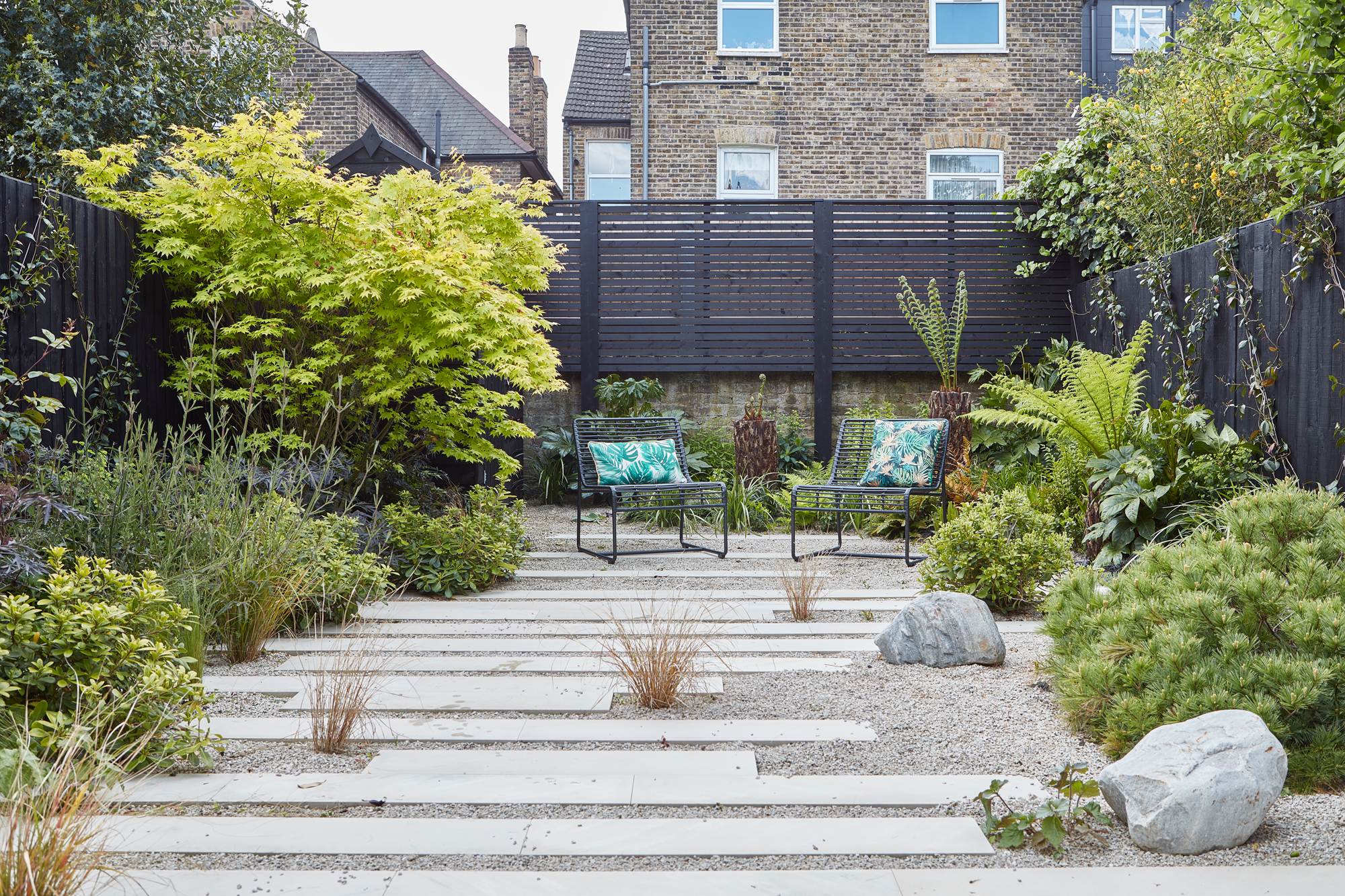
Opt for hardy plants to cut down on your gardening time
It's so easy to be tempted into buying a whole host of tender plants when they're on display in the garden center in spring and summer. But remember that they can't stay outside over winter and will need wrapping up and bringing undercover just as it starts to get cold and miserable.
For an easy life, look for plants that are labelled as fully hardy for your low maintenance garden ideas.
28. Put down the spade
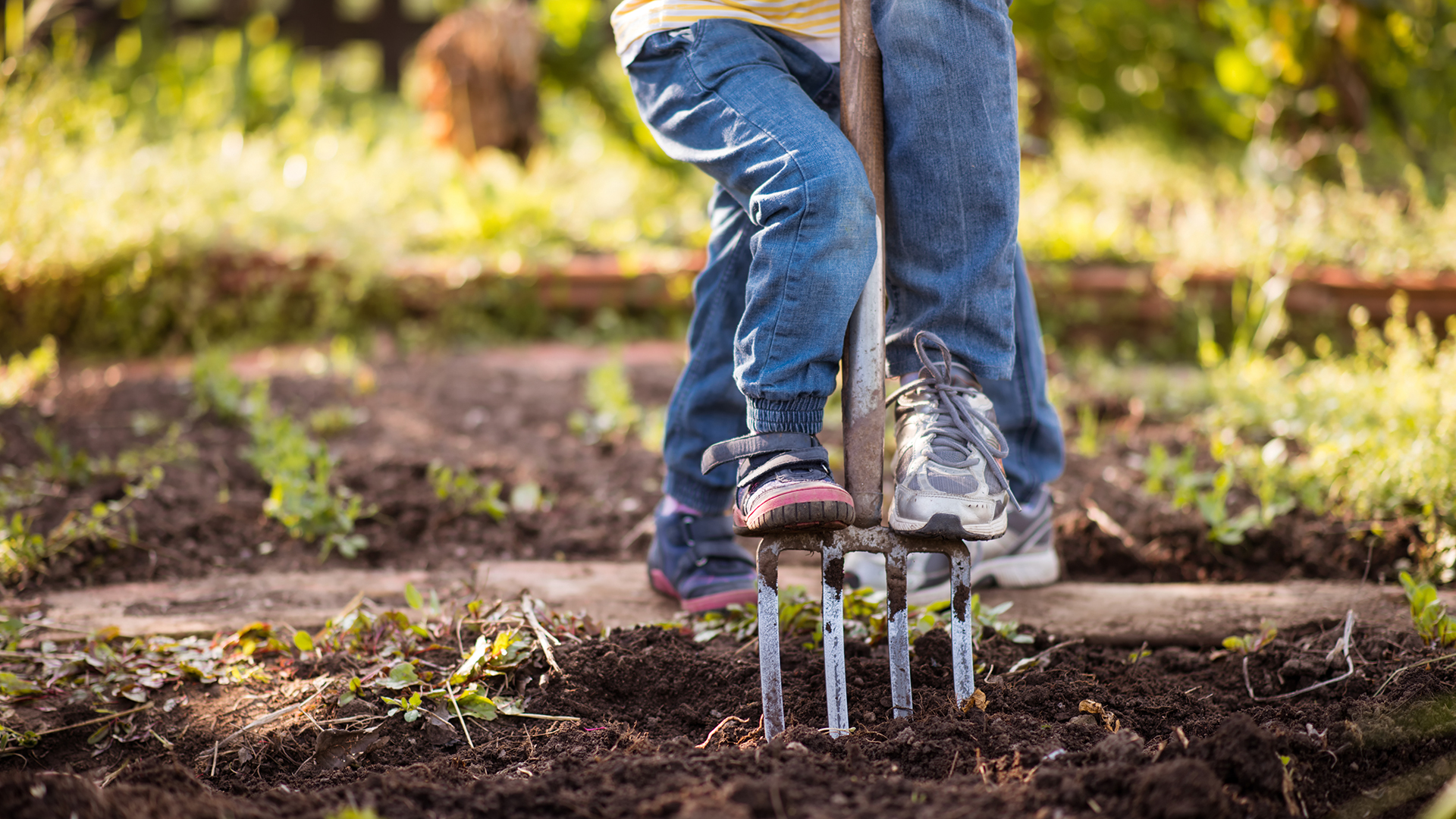
Try a 'no-dig' method for minimal gardening effort
You could spend hours digging over your beds and borders at the start of every spring, but supporters of the 'no-dig' method of gardening argue that it's better for the soil, for the plants grown in it, and for your back, to leave well alone.
Instead, they advocate adding a thick layer of garden compost or well-rotted manure straight on top of the soil, to feed it and to suppress weeds by blocking out light (some first add a layer of cardboard too, to increase the light-blocking effect).
No digging, less weeding and super-healthy plants – you can see why many consider this to be a no-brainer.
Want to know more? Our no dig gardening guide has plenty more expert tips.
29. Keep on top of little jobs, but often
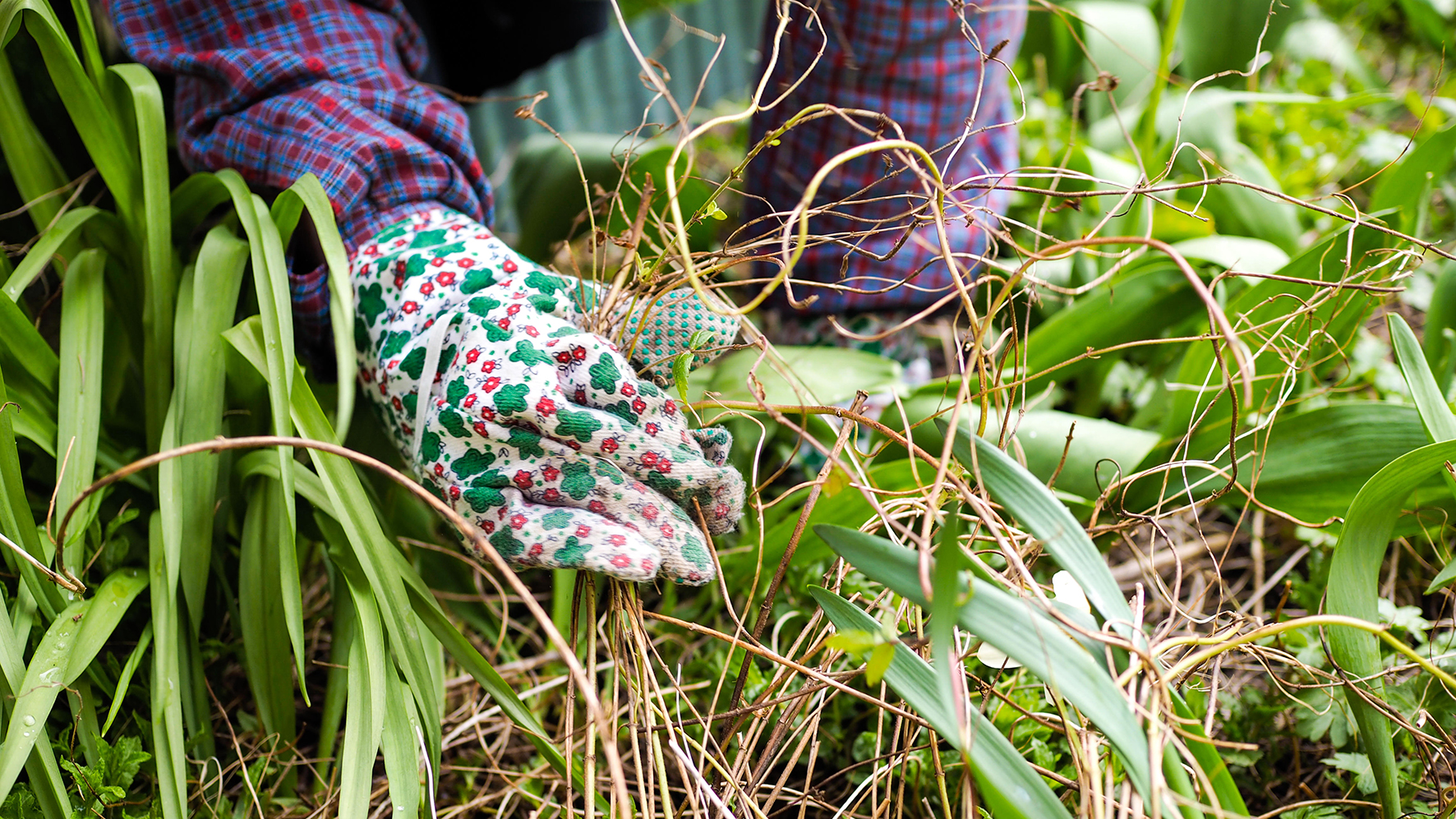
Don't let the weeds build up
Keep on top of weeding by pulling out the odd dandelion or strand of bindweed whenever you see them as you stroll around the garden. That way, it becomes a much less onerous chore than if you leave the weeds until they're starting to take over the garden and dealing with them has turned into a major undertaking.
Leave a small bucket or spare plastic flowerpot discreetly hidden in or near each border so you can simply drop weeds in as you pull them. Once you've filled it with weeds, tip them onto the compost heap or bin them.
Need more advice on how to get rid of weeds and stop them from spreading? Our dedicated guide has everything you need to know.
How do you make a low maintenance flower bed?
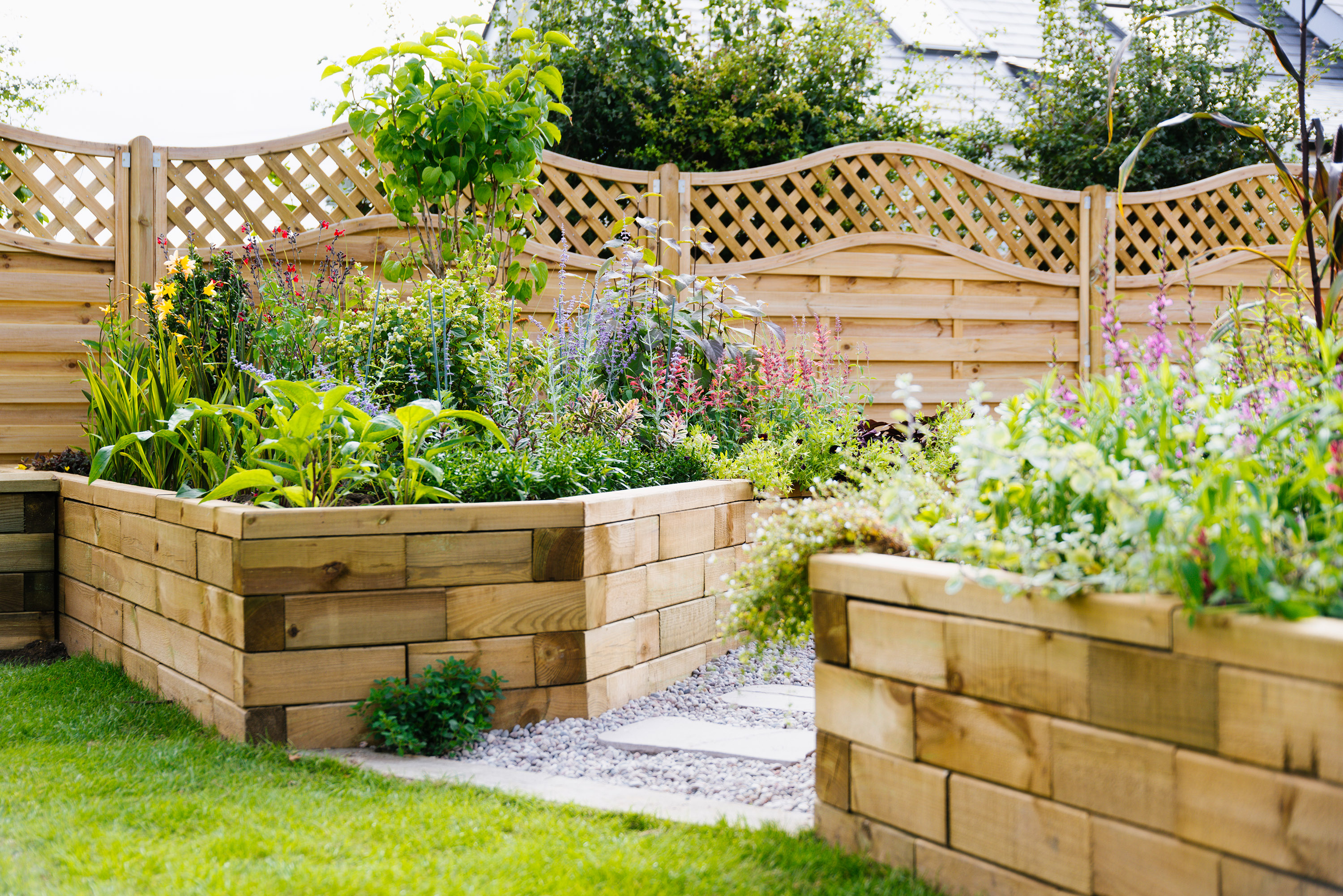
Making your beds low maintenance is relatively straight forward
Making your low maintenance flowerbed needn't be hard, just follow this quick and easy checklist to get started:
- Opt for raised beds for easy access.
- Install an irrigation system – it's simple and inexpensive to install, suggests gardening expert Gena Lorainne of Fantastic Services.
- Fill with low maintenance plants (see below).
- Look for jumbo-bedding packs to brighten up empty spaces quickly, suggests Sarah Squire from Squire's Garden Centres.
- Remember to mulch, to stop weeds from taking over. Flowers, shrubs, and even trees will benefit, says gardening expert Gena Lorainne.
What are the best low maintenance plants?
'Bet on perennials!' says gardening expert Gena Lorainne of Fantastic Services. 'They flower for years and provide color and contrast to your garden.'
'They also spread quickly, grow in almost anything, and trust me they don't need maintenance at all,' Gena adds. 'Sometimes they may seem out of control by the end of autumn, but a quick stem chop will sort them efficiently.' Take a look at our guide to autumn pruning to get the know-how.
'Avoid fast-growing hedges,' Gena continues. 'They look very attractive, and most people use them for privacy screening or even for a fence, but they tend to be high maintenance. They need regular trimming, and if you are not able to do the job by yourself, it will cost you dearly.'
Sarah Squire of Squire's Garden Centres also shares her tips. 'Focus on planting what you love and love what you plant,' she says. 'Roses are one of my favorites, in particular 'Gertrude Jekyll' for a shrub rose and 'The Generous Gardener' as a climber. Both are such good performers.'
'Hydrangeas and hardy fuchsias bloom on and on in late summer, and my Salvia 'Hot Lips' often flowers into October,' Sarah continues. 'Also, never underestimate the power of a good shrub. For year-round interest and structure the garden shrub is a thing of beauty and needs very little care once established.'

Sarah is a freelance journalist and is lucky to be able to write about her two main passions: gardening and food. She recently took on an allotment too, and is really loving growing all her own fruit and veg then bringing it home to try out in new recipes for her food and gardening blog, A Cook's Plot.

